- Academic Calendar
- Campus Services
- Faculties & Schools
- Student Service Centre
- UBC Directory
You are reading the 2024/25 Academic Calendar. The 2023/24 version remains in effect until August 31, 2024 and is available here .
Degrees Offered: Ph.D., M.A.
T. Cheek, C. Crowston, B. Effros, E. Glassheim, A. Kojevnikov, T. Loo, T. Myers, P. Raibmon, J. Roosa, C. Thrush, J. Wang.

Associate Professors
C. Booker, R. Brain, B. Bryce, J. Byrne, J. Christopoulos, J. Dixon, M. Ducharme, J. Hanser, L. Ishiguro, S. Lee, R. Menkis, B. Miller, D. Morton, A. Murphy, L. Paris, H. Safieddine, L. Shin, H. Tworek, C. Webster, H. Yu.
Assistant Professors
K. McCormick, S. Yin.
- Program Overview
The Department of History offers Ph.D. and M.A. programs, each requiring a dissertation/thesis, in the fields of Asian, Canadian, First Nations, British and European (early modern and modern), U.S., Latin American, and Environmental History and in the History of Science.
In addition to defining fields regionally, the Department emphasizes thematic, interdisciplinary, and transnational approaches to the study of the past. The following thematic research clusters highlight the interests and expertise of departmental members:
- History of Science, Technology, and Medicine
- Global History, Maritime History, and the History of Empire
- First Nations, Aboriginal, and Indigenous History
- Environmental History
- Ethnicity, Race, and Nationalism
- Gender, Sexuality, and the Body
- International Relations
- Culture/Power/History
- Children and Youth
- Migration, Borderlands, and Transnational History
- Politics, Political Culture, and State Power
- Law and Society
- Communities
UBC library has extensive holdings that facilitate graduate research. Holdings include: government publications; state papers; newspapers; extensive collections of early modern European pamphlets and literature; and one of the leading research libraries for East Asian Studies in North America. The library also contains notable collections of books on the history of the American West, of Canada (one of the best in Canada, with large sections on BC and the Prairie West), international relations, Germany (the best in Canada), radical movements in Europe and North America, and medicine, science, and technology (Woodward Library).
For detailed information on the Ph.D. and M.A. programs, please visit the Department .
- Doctor of Philosophy
- Admission Requirements
Prerequisites for admission to the Ph.D. program include a master's degree (or equivalent) in History. In certain cases others may also be eligible to apply. Transfer from the M.A. to the Ph.D. program is permitted under Faculty of Graduate and Postdoctoral Studies regulations. Consult the Department for details.
- Program Requirements
The Ph.D. program consists of 9 credits of coursework in the first year of studies, made up of HIST_V 525 - Professional Development for Historians seminar in Winter Term 1, HIST_V 699 – Ph.D. Research Seminar (the writing seminar) in Winter Term 2, and a third course to be determined in consultation with the supervisor. This third course must be a Historiography or Professional Development seminar if one has not already been taken at the MA level (to be approved by graduate advisor). It also consists of comprehensive examinations in two fields, one based on area and period and the other thematic, a language requirement, and a dissertation proposal. The major requirement for the Ph.D. is completion of a research dissertation meeting Faculty of Graduate and Postdoctoral Studies requirements.
Master of Arts
Prerequisites for admission to the M.A. program include, but are not limited to, a four-year B.A. with History honours or History major. Consult the Department for details.
The M.A. program consists of 18 credits of coursework and a 40-page thesis.
Emphasis in Science and Technology Studies for Doctoral and Masters Students
Both the Ph.D. and M.A. in History offer students an opportunity to focus a portion of their studies towards an emphasis in Science and Technology Studies (STS). The STS emphasis offers opportunities for advanced research and study of scientific work and thought from a variety of perspectives associated with the humanities and social sciences. Students in the STS emphasis are required to take STS_V 501 (3), STS_V 502 (3), and STS_V 597 (M.A.) or STS_V 598 (Ph.D.).
For more information on the STS emphasis, please see the STS Webpage .
- Contact Information
Department of History 1297-1873 East Mall Vancouver, BC, Canada V6T 1Z1 Tel: 604.822.2099 Fax: 604.822.6658 Email: [email protected] Web: history.ubc.ca
Faculties, Colleges, and Schools
- Introduction
- Applied Science
- Architecture and Landscape Architecture
- Audiology and Speech Sciences
- Commerce and Business Administration
- Community and Regional Planning
- Graduate Studies
- Information
- Kinesiology
- Land and Food Systems
- Pharmaceutical Sciences
- Population and Public Health
- Social Work
- Academic Advising
- Academic Regulations
- Degree Requirements
- Minor in Arts
- Minor in Commerce
- Minor in Entrepreneurship
- Minor in Honours Mathematics
- Minor in Science
- Dual Degree Program in Arts and Applied Science
- Pre-Med Alternative Path
- Curriculum and First Year
- Biomedical Engineering
- Chemical and Biological Engineering
- Civil Engineering
- Electrical and Computer Engineering
- Engineering Physics
- Environmental Engineering
- Geological Engineering
- Integrated Engineering
- Manufacturing Engineering
- Materials Engineering
- Mechanical Engineering
- Mining Engineering
- Co-operative Education Program
- Professional Associations
- Joint UNBC/UBC Program: Environmental Engineering
- Post-Baccalaureate Certificate in Mechanical Engineering in the BC Context
- Graduate Certificate in Global Mine Waste Management
- Graduate Certificate in Applied Geological Engineering
- Master of Engineering
- Master of Engineering Leadership in Advanced Materials Manufacturing
- Master of Engineering Leadership in Clean Energy Engineering
- Master of Engineering Leadership in Dependable Software Systems
- Master of Engineering Leadership in High Performance Buildings
- Master of Engineering Leadership in Integrated Water Management
- Master of Engineering Leadership in Naval Architecture and Marine Engineering
- Master of Engineering Leadership in Sustainable Process Engineering
- Master of Engineering Leadership in Urban Systems
- Master of Health Leadership and Policy in Clinical Education
- Master of Health Leadership and Policy in Seniors Care
- Department of Chemical and Biological Engineering
- Department of Civil Engineering
- Department of Electrical and Computer Engineering
- Engineering Physics Program
- Geological Engineering Program
- Integrated Engineering Program
- Department of Materials Engineering
- Department of Mechanical Engineering
- Department of Mining Engineering
- Dean's Office
- Honours Option
- Coordinated International Experience
- Certification and Professional Association
- Appeal Procedures
- Professional Association and Certification
- Time Limit for Completion of Degree Requirements
- Master of Architecture/Master of Landscape Architecture Dual Degree Program Option
- Master of Urban Design
- Academic Staff
- Admission and Transfer
- Transfer and Exchange Credit
- Credit Requirements and Regulations
- Degree Requirements for students who enter the program in 2023/24 or earlier
- Degree Requirements for students who enter the program in 2024/25 or later
- First-Year Program Options
- Degree Program Options
- Registration
- Science Credit Exclusion Lists
- Adding a Specialization Outside the Faculty of Arts
- Examinations
- Academic Recognition, Promotion, and Continuation
- Academic Concession
- Academic Leave
- Readmission
- Second Degree Studies
- Dual Degree Program Option in Arts and Science
- Dual Degree Program Option in Arts and Applied Science
- Dual Degree Program Option: Bachelor of Arts and Master of Management
- Dual Degree Program Option: Bachelor of Arts, UBC and Sciences Po
- African Studies
- Ancient Mediterranean and Near Eastern Studies
- Anthropology
- Archaeology
- Art History, Visual Art, and Theory
- Arts Studies
- Asian Canadian and Asian Migration Studies
- Asian Studies
- Canadian Studies
- Central, Eastern and Northern European Studies
- Cinema Studies
- Cognitive Systems
- Computer Science
- Creative Writing
- Critical Studies in Sexuality
- Environment and Society
- Environment and Sustainability
- Family Studies
- First Nations and Endangered Languages
- First Nations and Indigenous Studies
- French Language, Literatures and Cultures
- Gender, Race, Sexuality and Social Justice
- Geographic Information Science and Geographical Computation
- German Studies
- Health and Society
- Human Geography
- Indigenous Land-Based Studies
- Informatics
- Interdisciplinary Studies
- Italian and Italian Studies
- Jewish Studies
- Journalism and Social Change
- Latin American Studies
- Linguistics
- Mathematics
- Medieval Studies
- Middle East Studies
- Modern European Studies
- Museum Studies
- Nordic Studies
- Political Science
- Program in the Study of Religion
- Romance Studies
- Russian and Slavic Languages and Literature
- Science Studies
- South Asian Studies
- Speech Sciences
- United States Studies
- Urban Studies
- Writing and Communication
- First Year Program Options
- Dual Degree Program Option: Bachelor of Fine Arts and Master of Management
- Film Production
- Theatre Design and Production
- Bachelor of International Economics
- Degree Requirements for students who entered the program in 2022/2023 or earlier
- Program of Study Guide for students who entered the program in 2022/2023 or earlier
- Degree Requirements for students entering the program in 2023/24 or later
- Minor Programs
- Dual Degree Program Option: Bachelor of Media Studies and Master of Management
- Co-operative Education Programs
- Diploma in Applied Creative Non-Fiction
- Diploma in Art History
- Diploma in Film Production
- Diploma in Linguistics
- Certificate in Climate Studies and Action
- Undergraduate Certificate in Data and Models in Political Science
- Certificate in Dechinta Community and Land-Based Research
- Certificate in General Arts Studies: Experiential Learning Through Social Justice
- Centre for European Studies
- Institute of Asian Research
- Institute for Critical Indigenous Studies
- Institute for Gender, Race, Sexuality and Social Justice
- Liu Institute for Global Issues
- Graduate Programs
- Department of Ancient Mediterranean and Near Eastern Studies
- Department of Anthropology
- Department of Art History, Visual Art, and Theory
- Department of Asian Studies
- Department of Central, Eastern and Northern European Studies
- Department of English Language and Literatures
- Department of French, Hispanic and Italian Studies
- Department of Geography
- Department of History
- Department of Linguistics
- Department of Philosophy
- Department of Political Science
- Department of Psychology
- Department of Sociology
- Department of Theatre and Film
- School of Public Policy and Global Affairs
- B.A.Sc. in Biomedical Engineering
- Admission for Students Entering the Program in 2023/24 or Later
- Co-operative Education
- Minors and Concentrations
- Commerce Scholars Program
- Business and Computer Science – Combined Major
- Business Technology Management
- Entrepreneurship
- General Business Management
- Global Supply Chain and Logistics Management
- Operations and Logistics
- Organizational Behaviour and Human Resources
- Real Estate
- Bachelor of Business in Real Estate
- UBC Bachelor of Commerce Dual Degree with Faculty of Business and Economics, University of Hong Kong
- Undergraduate Program-Master of Management Dual Degree Program Option
- Master of Business Administration
- International Master of Business Administration
- Executive Master of Business Administration
- Professional Master of Business Administration
- Master of Business Analytics
- Master of Management
- Dual Degree Program Option: J.D./M.B.A.
- Dual Degree Program Option: M.B.A. / M.B.A.N.
- Dual Degree Program Option: UBC M.B.A./Yale M.A.M.
- Dual Degree Program Option: UBC M.M./Yale M.M.S.
- Diploma in Accounting Program
- Professional and Diploma Courses
- Executive Education
- Chartered Professional Accountants of BC
- Real Estate Institute of BC
- Bachelor of Fine Arts
- B.A. Minor in Creative Writing
- Graduate and Post-Graduate Programs
- General Practice Residency Training Program
- Department of Oral Biological and Medical Sciences
- Department of Oral Health Sciences
- Adding a Specialization
- Dual Degree Program Option: Bachelor of International Economics and Master of Management
- Bachelor of Arts in Economics
- Pre-Admission Advising
- Application
- Academic Policies and Regulations
- Degree Requirements for Indigenous Teacher Education
- Degree Requirements for Elementary & Middle Years Teacher Education
- Degree Requirements for Secondary Teacher Education
- Career Education Program Option: Chef Education Specialization
- Certificate of Qualification
- Certificate in Early Years Education (EYED)
- Certificate in Health & Wellness
- Certificate in Infant Development and Supported Childcare (IDSC)
- Certificate in Teacher Librarianship (LIBE)
- Certificate in Teaching About Visual and Material Culture
- Certificate in Teaching English as a Second Language
- Undergraduate Certificate in Adult Learning and Education
- Undergraduate Certificate in Textile Studies
- Veterans Transition Certificate in International Development & Human Security
- Diploma in Education
- Continuing Professional and English Language Education
- Centre for Cross-Faculty Inquiry in Education
- Department of Curriculum and Pedagogy
- Department of Educational and Counselling Psychology, and Special Education
- Department of Educational Studies
- Department of Language and Literacy Education
- Centre for Early Childhood Education and Research
- Centre for Interdisciplinary Research and Collaboration in Autism
- Indigenous Education
- Indigenous Teacher Education Program (NITEP)
- Office of Research in Education
- Psychological Services and Counselling Training Centre
- Program Approval and Advising
- First Year Options
- First Year Curriculum
- Bioeconomy Sciences and Technology
- Conservation
- Forest Management
- Forest Operations
- Forest Sciences
- Wood Products
- Dual Degree Program in Natural Resources and Education
- Dual Degree Program in Forest Sciences and Education
- Forest Resources Management Major
- Forest Resources Management Major (Community and Indigenous Forestry Concentration)
- Forest Operations Major
- Dual Degree Program in Natural Resources Conservation and Education
- Co-Operative Education Program
- Haida Gwaii Semesters
- Graduate Certificate in Forest Management and Conservation
- Forestry Co-op
- Exchange Programs
- Awards and Financial Assistance
- Lectureships
- Department of Forest Resources Management
- Department of Forest and Conservation Sciences
- Department of Wood Science
- Student Services
- University Research Forests
- Doctoral Degrees
- Master's Degrees
- Graduate Diplomas
- Graduate Certificates
- Students Transferring to UBC with Faculty Supervisors
- Visiting Students
- Transfer Credit for Access Studies
- Authenticity of Documents
- Ownership of Application Documents
- Delay in Start of Program
- Graduate Appeals on Admission or Readmission Decisions
- English Language Proficiency Standards and GRE Requirements
- Doctoral Student
- Master's Student
- Qualifying Student
- Visiting Graduate Student
- On-Leave Status
- Program of Study
- Transfer Credit
- Undergraduate Eligibility for Graduate Courses
- Academic Progress
- Residency Requirements and Duration of Program
- Examinations, Master's Theses, and Doctoral Dissertations
- Academic Appeals
- Withdrawal, Reinstatement, and Readmission
- Student Conduct and Discipline
- Academic Record
- Graduate Student Leaves of Absence
- Graduate Student Parental Accommodation Policy
- Graduate Student Vacation Policy
- Joint Doctoral Research Scholars
- Merit-Based Awards
- Awards from External Funding Agencies
- Minimum Funding for Ph.D. Students
- International Tuition Awards
- Teaching and Research Assistantships
- Need-Based Awards for Graduate Students
- Degrees Offered
- Adult Learning and Education
- Adult Learning and Global Change
- Agricultural Economics
- Anatomy and Cell Biology
- Ancient Culture, Religion, and Ethnicity
- Applied Animal Biology
- Applied Ethics
- Applied Mathematics
- Architecture
- Archival Studies
- Archival Studies and Library and Information Studies
- Art Education
- Art History
- Art History, Critical and Curatorial Studies
- Asia Pacific Policy Studies
- Atmospheric Science
- Biochemistry and Molecular Biology
- Bioinformatics
- Biotechnology
- Business Administration
- Cell and Developmental Biology
- Children's Literature
- Cinema and Media Studies
- Classical and Near Eastern Archaeology
- Counselling Psychology
- Craniofacial Science
- Creative Writing/Theatre
- Cross-Faculty Inquiry in Education
- Curriculum and Leadership
- Curriculum Studies
- Design, Technology and Society
- Digital Media
- Early Childhood Education
- Educational Administration and Leadership
- Educational Leadership and Policy
- Educational Studies
- Educational Technology
- Experimental Medicine
- Film Production/Creative Writing
- Food Science
- Genetic Counselling
- Genetic and Genomic Counselling
- Genome Science and Technology
- Geological Sciences
- Germanic Studies
- Global Surgical Care
- Health, Outdoor and Physical Education
- Higher Education
- Hispanic Studies
- Home Economics Education
- Human Development, Learning, and Culture
- Human Nutrition
- Individual Joint Doctoral Programs
- Interdisciplinary Oncology
- Land and Food Systems, Integrated Studies in
- Landscape Architecture
- Language and Literacy Education
- Library and Information Studies
- Library, Archival, and Information Studies
- Literacy Education
- M.D./Ph.D. (Combined Program)
- Materials and Process Engineering
- Mathematics Education
- Measurement, Evaluation, and Research Methodology
- Media and Technology Studies Education
- Medical Genetics
- Medical Physics
- Microbiology and Immunology
- Modern Language Education
- Museum Education
- Music Education
- Neuroscience
- Nutrition and Dietetics
- Occupational Therapy
- Occupational and Environmental Hygiene
- Oceanography
- Oceans and Fisheries
- Pathology and Laboratory Medicine
- Pharmacology
- Physical Therapy
- Plant Science
- Public Policy and Global Affairs
- Rehabilitation Sciences
- Religious Studies
- Reproductive and Developmental Sciences
- Resources, Environment and Sustainability
- School and Applied Child Psychology
- Science and Technology Studies
- Science Education
- Social Studies Education
- Society, Culture and Politics in Education
- Soil Science
- Special Education
- Teaching English as a Second Language
- Urban Design
- Vocational Rehabilitation Counselling
- Women+ and Children’s Health Sciences
- Graduate Diploma in Pharmacy Leadership
- Graduate Certificate in Migration Studies
- Dual Program Options
- Human-Computer Interaction (HCI)
- Graduate Co-operative Education
- Data and Statistics
- Office of the Dean and Vice-Provost
- Minor in Informatics
- Bachelor of Arts, Minor in Informatics
- Master of Archival Studies/Master of Library and Information Studies
- Master of Arts in Children's Literature
- Student Awards
- Neuromechanical and Physiological Sciences
- Social and Behavioural Sciences
- Multi-disciplinary Science
- Dual Degree Program Option in Kinesiology and Management
- Credit Exclusion Lists
- Registration and Program Approval
- Attendance and Examinations
- Year Promotion and Academic Standing
- Credit Load, Credit/D/Fail, Repeating Courses, and Taking Courses Outside UBC
- Withdrawals, Academic Leave, and Letter of Permission
- Requirements to Graduate
- Communication Requirement
- Dean's Honour List
- Honours Standing
- Advising Office
- Applied Animal Biology Major
- Applied Plant and Soil Science Major
- Food and Environment Major
- Sustainable Agriculture and Environment Major
- Dietetics Major
- Food Market Analysis Major
- Food and Nutritional Sciences Double Major
- Food Science Major
- Food, Nutrition, and Health Major
- Nutritional Sciences Major
- Dual Degree Program in Food, Nutrition and Health and Education
- Admission for students entering the program in 2024/25 or later
- Degree Requirements for Major in Business and Markets for students entering in 2024/25 or later
- Degree Requirements for Major in Data Analytics for students entering in 2024/25 or later
- Admission for students entering the program in 2023/24 or earlier
- Degree Requirements and Program Options
- Credit/D/Fail
- Dual Degree and Minor Options
- BC Institute of Agrologists
- Dr. and Mrs. A. S. Dekaban Foundation
- Graduate Certificate in Aquaculture
- Applied Biology
- Food, Nutrition, and Health
- Food and Resource Economics
- Combined Juris Doctor and Master of Business Administration
- International Degree Partnership Programs
- Law Society of British Columbia
- The UBC Law Review
- The Canadian Journal of Family Law
- Doctor of Philosophy and Doctor of Medicine
- Master of Global Surgical Care
- Master of Occupational Therapy
- Master of Physical Therapy
- Master of Physical Therapy and Doctor of Philosophy in Rehabilitation Sciences
- Master of Rehabilitation Science
- Master of Science
- Master of Science in Genetic Counselling
- Graduate Certificate in Genomic Counselling and Variant Interpretation
- Graduate Certificate in Global Surgical Care
- Graduate Certificate in Orthopaedic Musculoskeletal Physical Therapy
- Graduate Certificate in Rehabilitation
- Graduate Program in Cell and Developmental Biology
- Graduate Program in Neuroscience
- Interdisciplinary Oncology Program
- Community Medicine
- Dermatology and Skin Science
- Family Practice
- Internal Medicine
- Medical Microbiology
- Obstetrics and Gynaecology
- Ophthalmology and Visual Sciences
- Orthopaedics
- Radiation Oncology and Developmental Radiotherapeutics
- Advising and Application
- General Academic Regulations
- Canadian Midwifery Regulators Consortium
- Undergraduate Medical Education (M.D.)
- Department of Anesthesiology, Pharmacology, and Therapeutics
- Department of Biochemistry and Molecular Biology
- Department of Cellular and Physiological Sciences
- Department of Dermatology and Skin Science
- Department of Family Practice
- Department of Medical Genetics
- Department of Medicine
- Department of Obstetrics and Gynaecology
- Department of Occupational Science and Occupational Therapy
- Department of Ophthalmology and Visual Sciences
- Department of Orthopaedics
- Department of Pathology and Laboratory Medicine
- Experiential Learning
- Research Participation
- Student Association
- Undergraduate Teaching Assistant
- Master’s Program
PhD Program
- Opportunities
- Dissertations & Theses
- Research Streams
- Labs & Museums
- Research Initiatives
- Field Schools
- Publications
- Laboratory of Archaeology
- Hawthorn Lectures
- Featured Anthropologists
- Faculty Committees
- Awards & Awardees
- In Memoriam
- Job Opportunities
Structure a course of study towards your specific intellectual and practical interests in the Doctor of Philosophy (PhD) program at UBC Anthropology.
The PhD in Anthropology at UBC Vancouver is based upon a combination of residency, coursework, a comprehensive examination and dissertation, and is expected to be completed within six years. A new comprehensive examination guideline has been approved in Spring 2023.
PhD Degree Requirements
A student first gains full standing as a doctoral candidate within the Department by completing the following requirements:
- 24 months residency
- Minimum 18 credits of coursework
- A research proposal approved by the supervisory committee
- Satisfactory performance in the comprehensive examination
Coursework requirements for the PhD
The minimum 18 credits of coursework normally includes:
- ANTH 506 (the pro-seminar) (3 credits)
- ANTH 500 (History of Anthropological Thought), (6 credits)
- An advanced methodology course in the appropriate area (ANTH 516, 517, or 518) (3 credits)
- Two additional courses (6 credits)
If students have previously completed these courses, they should consult with their supervisor to determine an alternative course. Students who have taken an equivalent course to ANTH 500 at the MA level at a different university may apply to the Anthropology Graduate Students Committee (AGSC) to be released from the requirement.
Students may also be required as a condition of admission to take other courses to gain mastery of core subjects in the discipline. Up to 12 credits may be taken in the form of supervised reading courses where appropriate graduate seminars are not available and upon the agreement of instructors. The 18 credits of core courses will normally be in anthropology at the graduate level. The Supervisory Committee may require additional coursework, beyond 18 credits, including courses at the undergraduate level, in order to prepare students for research in their chosen field.
All doctoral students are required to complete a comprehensive examination successfully. After passing the comprehensive examination and defending the research proposal, the students reach candidacy.
Once they have attained candidacy, students are “ABD” (so have completed all degree requirements but the dissertation). They then undertake a substantive independent research project normally based in large part on field research which forms the basis of their dissertation. The candidate completes the degree upon successfully defending their dissertation in the University doctoral defence.
The major requirement for the PhD is completion of a research dissertation meeting UBC Graduate and Postdoctoral Studies requirements.
As soon as possible after admission to the program, and no later than the end of the first term of study, the student must meet with their Supervisory Committee to complete the Graduate Program Record (available from the Graduate and Undergraduate Program Coordinator).
In addition to biographical information and details of work done prior to admission to the PhD program, it will include details of the proposed course of study i.e., course numbers, titles, credit values, and names of instructors).
Once completed, the Graduate Program Record form must be submitted to the Anthropology Graduate Studies Committee (AGSC) for review and approval.
The Graduate Program Record is a permanent guide and record of progress in which courses, grades, information on the dissertation, leaves, and other pertinent information is entered. The student and the Supervisory Committee must review the record at least once a year (in April) and preferably more often. Significant alterations in an approved program — including changes in coursework, dissertation topic, and committee membership as well as leaves — must be reported to the AGSC for approval before being recorded in the Graduate Program Record.
Leave policy
UBC Graduate and Postdoctoral Studies allows leaves for personal, or medical reasons. Graduate students may also receive parental leave for the birth or adoption of a child. Leave requests must be submitted by the Graduate Advisor and reviewed by the Dean of UBC Graduate and Postdoctoral Studies.
PhD Dissertation
The PhD dissertation is intended to be an original and significant contribution to knowledge. In most cases, it entails original research involving fieldwork in the form of ethnographic studies, archaeological excavation and analysis, or archival research.
Supervisory Committees supervise and bear ultimate responsibility for approving research carried out by PhD candidates. It is critically important that PhD candidates keep their Supervisory Committees well informed of their research activities.
Evaluation of Progress
Students must meet with their Supervisory Committee at least once each term. The Supervisory Committee and course instructors prepare a detailed evaluation in April to submit to the Anthropology Graduate Studies Committee (AGSC). If in the considered opinion of the Supervisory Committee and the AGSC, a student does not make satisfactory progress, they may be required by the Department to withdraw. The AGSC notifies students and their Supervisory Committee of their status in the program each May.
Unless the circumstances are exceptional, a student who has not received a degree at the end of six winter sessions will be required to withdraw.
Extensions can only be granted by UBC Graduate and Postdoctoral Studies which must be petitioned by the AGSC on behalf of a student.
The Anthropology Standing Committee will review the file of any graduate student in the PhD program who receives a grade below 75% (“B”) in either the graduate seminar the History of Anthropological Thought (ANTH 500) or in one of the graduate methods courses (ANTH 516, 517, or 518).
Doctoral Comprehensive Examination
To demonstrate their comprehensive knowledge, students will prepare three sets of annotated bibliographies that engage with broad theoretical topics, an ethnographic area, or other topics appropriate for their subdiscipline. The reading lists will be developed by the student in consultation with their PhD committee, and each set will contain 30 sources with no more than 15 pages of annotations.
Under the supervision of their committee and based on their readings and annotations, students will proceed to write, within one month, two bibliographic essays of up to 25 pages each that identify the major contributions to two of the theoretical topics or ethnographic areas that they have studied. These written essays will be similar to those in the Annual Review of Anthropology in delineating current developments and main themes of research (including not only a critical analysis of existing literature, but also a discussion of emerging directions, gaps and opportunities). The student and the committee should agree on the target submission date. Conditional upon timely submission, the committee will aim to determine within 10 business days whether each essay is a ‘pass’ or ‘fail’.” Once approved by the supervisory committee, the written essays are not subject to further examination.
In consultation with their supervisory committee, students will prepare a research proposal of no more than 25 pages. The research proposal will summarize work on this topic, the significance of the proposed research, and will clearly describe how the work will be carried out. Once all the recommended revisions to the proposal have been completed, the student’s supervisory committee will recommend that the student proceed to a defence of their research proposal.
The student’s supervisory committee approves the readings, annotations, bibliographic essays and research proposal as completed (along with the research proposal), before recommending that the student proceed to the defence of their research proposal. (The supervisor must submit a memo to the AGSC chair and cc: the Graduate Program Coordinator to affirm this recommendation.) The supervisor may suggest two possible examiners from the Department of Anthropology, but the Examining Committee as a whole must be approved by the AGSC Chair. The supervisor is in charge of contacting the potential examiners. Examinations must be completed no later than three months prior to the G+PS deadline and must take place during one of the two examination periods:
- Spring- March/April/May during their second year
- Fall- October/November- final opportunity during students’ third year in the program
Advisors of students who are unable to complete their examinations during these periods may petition the AGSC for an extension or to hold the exam in another month. In any case, students must complete their exams before the end of the third year.
The format of the PhD proposal defence is similar to a dissertation defence. The Anthropology Graduate Studies Committee appoints two examiners with relevant expertise in the student’s area of research, as well as an examination chair. At the defence, the student gives a 20 to 30-minute presentation on their proposed research without reading from their proposal. The examiners then ask two rounds of questions about the proposed research. The examination chair may also ask for questions from the audience at the end of the first round of questions. After the second round of questions the student and audience leave the room while the examining committee deliberates. The examination is evaluated both on the strength of the written proposal and the strength of the student’s presentation. The committee may: (1) decide to pass the research proposal without revisions; (2) ask for minor or major revisions either under the supervision of the student’s committee or under the supervision of the entire examining committee; or (3) fail the student on the examination. The examination chair may cast a deciding vote if the committee is divided in their assessment. If a student fails their examination, they may revise their research proposal and schedule a second examination, which would be their final opportunity. Students who successfully complete the defence of their research proposal will be advanced to candidacy and are approved to begin their dissertation research, subject to ethical review approval if relevant.
These new provisions for the comprehensive exam process in Anthropology will go into effect as of March 1, 2023 . Students who began their PhD studies in 2022 or earlier have the option of taking a written comprehensive examination under the previous provisions if they so choose.
- BA Philosophy Program
- Philosophy Essay Clinic
- Opportunities
- Master’s Program
PhD Program
- Philosophy Placement Program
- Job Opportunities
The PhD program in the Department of Philosophy provides students with intense philosophical training, and can help them transition to careers in philosophical research and teaching.
Those admitted will work with award-winning faculty members who engage in research in the philosophy of science, philosophy of mind, metaphysics, epistemology, philosophy of language, aesthetics, ethics, social/political philosophy, logic, Asian philosophy and the history of philosophy, just to name a few.
Program Overview
PhD students will take courses in the first years to provide them with expertise in a broad range of philosophical topics, including value theory, the history of philosophy, the core areas of metaphysics and epistemology as well as their own personal research interests. After the coursework comes the comprehensive exam, followed by prospectus and dissertation.
Students interested in a PhD in philosophy must be aware of these degree requirements.
- Two years’ residency at UBC,
- Eight one-term courses at or above the 500 level,
- During the first year, five one-term courses including four at the 500 level or above and four with a minimum average of 80% (A- or 3.7 GPA),
- During the second year, complete the PhD coursework requirement with an overall average of 80%.
For students who have not obtained a master’s degree
- Three years’ residency at UBC,
- Ten one-term courses, including eight at the 500 level or above,
- A minimum average of 80% (A- or 3.7 GPA) in six one-term courses,
For all doctoral candidates
- One presentation to the Philosophy Graduate Colloquium during the first two years
- Complete the Comprehensive Exam
- Complete a dissertation prospectus and oral presentation
- Complete a dissertation of approximately 60,000 words and public dissertation defence
Graduate Resources
As part of the program, graduate students will have access to a number of resources that support each individual’s work and research.
Graduate Regulations (revised September 2023)
This document contains full details on MA and PhD procedures and requirements, including information on the following topics: the MA course-only and thesis options; transferring from the MA to the PhD program; residency requirements; the course distribution and formal methods requirements; the proseminar; the comprehensive examination; the PhD prospectus; leaves of absence; and PhD thesis preparation. For details on these and other topics, please consult the table of contents.
Graduate students are crucial to the life of the department. They are expected to regularly attend colloquia, to elect a representative for faculty meetings, and to organize periodic social events. There are also work in progress seminars where graduates and faculty are invited to share and discuss their developing research projects. In addition, there is currently an active Graduate Student Colloquium for graduate student presenters only.
Reading groups are also a nice way to explore philosophy in a more informal setting, and students have access to a reading room in addition to having space in the graduate lounge. Lastly, graduate students have the opportunity to hone their teaching skills as TAs or instructors.
Science and Technology Studies (STS)
Several philosophy department faculty are members of the Science and Technology Studies program in cooperation with faculty from History, English, and other departments. The STS program offers an MA program and a PhD stream within the philosophy PhD. Philosophy PhD students enrolled in the PhD stream take three STS seminars as part of their graduate coursework. STS seminars are frequently cross-listed with philosophy seminars and are open to other graduate students.
Centre for Applied Ethics
Supervision in applied ethics, including biomedical ethics, environmental ethics, and business and professional ethics, is available in conjunction with the Maurice Young Centre for Applied Ethics . The Centre for Applied Ethics is an independent academic unit with resources for graduate education in applied ethics. Graduate students in the philosophy department can seek research supervision from Centre faculty.
Philosophy PhD Co-op Option
The Arts Co-op Program offers students enriched educational experiences for personal and professional growth. Co-op is a high-impact educational program that allows you to alternate dissertation-writing terms with work terms, during which you gain meaningful paid work experience. We work with a diverse range of community partners and sectors to provide transformative workplace learning for co-op students. The Arts PhD Co-op Program allows you to explore different career options, while gaining paid, professional work experience and a network of contacts. Some students are able to secure work terms that are relevant to their dissertation research, while others choose to pursue work experience that diversify their expertise and give them range. Students complete three work terms of 4 months each over the two to three years after achieving candidacy. The PhD Co-op option is currently being piloted for Philosophy students. Philosophy PhD Co-op option
Co-operative agreement with Simon Fraser University
Philosophy graduate students at UBC may take courses in the Philosophy Department at Simon Fraser University without paying additional fees. Supervisory committees may include members from both departments.
Quick Links
- BA History Program
- Opportunities
- Undergraduate Advising
- Writing Centre
- Master’s Program
- PhD Program
- Academic Community
- Research Clusters
- Published Books and Monographs
- Recently Published Articles
- Former Members
- Job Opportunities
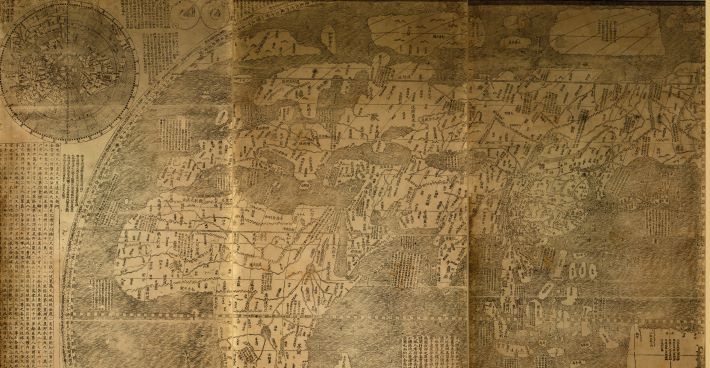
Studying Chinese History at UBC
The Department of History at the University of British Columbia offers a wealth of opportunities for both undergraduate and graduate students interested in studying the history of China. Our faculty’s strengths range from the earlier empires to the contemporary Sinosphere.
Undergraduate Students
Undergraduate students are able to choose from a wide variety of courses, the themes of which include cover almost every aspect of China’s past and present, including the cultural, social and political history of imperial China; China’s Eurasian, maritime, and global connections; the history of medicine and healing in China; revolutionary China and the impact of Maoism; education and society in China; warfare in China; history of migration; and the history of Chinese communities in Vancouver, Canada and North America.
Graduate Students
Our M.A. and Ph.D. programs, both funded, offer comprehensive and in-depth training for students with different career aspirations. Our core courses help students understand the present field (and job market) of history, prepare students with an in-depth understanding of recent historiographical turns, and further strengthen students’ skills in Sinology, digital humanities, and other fields. A wide range of elective courses allow students to further their research.
In addition, our biweekly “clusters” (or reading groups) alternate between discussions of work-in-progress by graduate students/faculty members (China Cluster) and close readings of primary sources (Ming & More).
In the future, this website will post our courses, cluster events, and other updates.
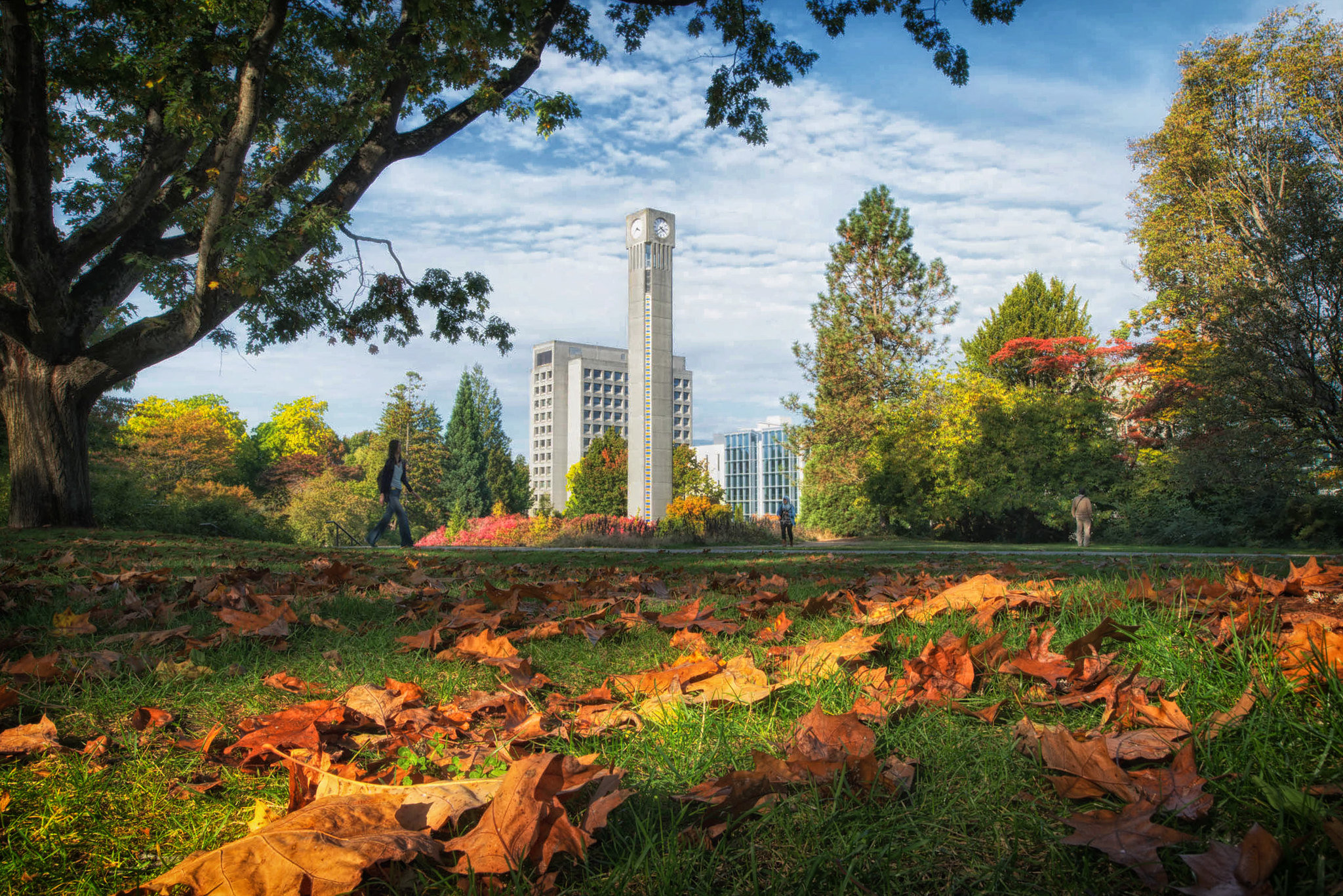
Chinese History Courses
- Minor in Informatics
- Master’s Programs
PhD Program
- Areas of Focus
- Course List
- Opportunities
- Welcome to iSchool!
- Research Spaces
- Initiatives
- Publications
- Thesis Collection
- Submit News & Events
- Strategic Documentation
- Visiting Professors Program
- Visiting Students Program
- Job Opportunities
- Recruit a Student
UBC School of Information’s Doctor in Philosophy in Library, Archival and Information Studies is a four-year funded program that combines coursework with focused independent study and research. Our students have ready access to faculty members and benefit from unique opportunities at a comprehensive, world-class, research-intensive university.
We designed our PhD program to provide advanced research education for outstanding and highly motivated students who have already obtained a Master of Archival Studies (MAS) degree, a Master of Library and Information Studies (MLIS) or an equivalent related degree.
- Information seeking, retrieval and use
- Human-computer interaction and design
- Critical approaches to information systems and services
- Information appraisal, classification and organization
- Social computing
- Information ethics and information policy
- Personal archives, digital archives, and online communities
- Records and information management
- Data management and natural language processing
- Blockchain technologies, information trust and governance
- Digital cultural heritage and preservation
- Digital humanities
Program highlights
- Advanced education in information and archival studies
- Focus on scholarship and research, with strong support for interdisciplinary approaches
- State-of-the-art research and learning facilities at a world-class university
Identify a potential supervisor
The doctoral program is highly selective. The strongest applicants have research interests aligned with the faculty expertise in the School of Information. Identifying a faculty member who can support your application does not guarantee an offer of admission. Still, it can ensure that your application is read carefully in light of the limited number of positions available each year. The following paragraphs provide suggestions for reaching out to potential supervisors.
- Familiarize yourself with program requirements. You want to learn as much as possible from the information available before reaching out to a faculty member.
Focus your research
- Identify faculty members who are conducting research in your specific area of interest.
- Read up on the faculty members in the program and the research conducted in the department.
- Familiarize yourself with their work, and read their recent publications and past theses/dissertations they supervised. Be sure that their research is indeed what you are hoping to study.
Make a good impression
- Do not send mass emails to everyone in the department hoping for a match.
- Address the faculty members by name. Your contact should be genuine rather than generic.
- Include a brief outline of your academic background, why you are interested in working with the faculty member, and what experience you could bring to the department.
- Highlight your achievements and why you are a top student. Faculty members receive dozens of requests from prospective students, and you may have less than 30 seconds to pique someone's interest.
- Convey the specific ways you are a good fit for the program.
- Convey the specific ways the program/lab/faculty member is a good fit for the research you are interested in/are already conducting.
- Be enthusiastic, but don't overdo it.
Course requirements
Students entering the doctoral program with an approved master’s degree will be required to take a minimum of 24 credits of coursework before achieving candidacy.
Your advisor may recommend additional courses, and you may be required to take courses in the iSchool Master of Library and Information Studies program or the Master of Archival Studies program to provide sufficient background for your research focus.
In addition, we strongly encourage our doctoral students to take graduate-level courses from other UBC departments in their chosen area of research.
Program details
Upon entering the doctoral program, you will be assigned an adviser who will work with you to develop an appropriate coursework schedule relevant to your research plan. You will take advance study in the major and minor areas (LAIS 620 and 621) with your advisor or the faculty member(s) best aligned with your research focus.
The qualifying exams assess your knowledge of the relevant literature, analytic capacity, and skill in developing original written and oral presentations of ideas. Typically, your advisor becomes your dissertation supervisor through the qualifying examinations.
Upon successfully completing the qualifying examinations, you will enter the dissertation stage of the program. Working closely with your supervisor, you will assemble a dissertation committee of no fewer than two additional eligible faculty members; these may be the same faculty who assessed your qualifying exams.
You will develop and defend a dissertation proposal of not less than 30 pages following the guidelines in the Doctoral handbook of policies and procedures . The goal of the proposal is to ascertain your research readiness.
Upon the successful defence of the proposal, you are recommended for candidacy.
You will then undertake the research and writing to prepare the dissertation following the guidelines of the Faculty of Graduate and Postdoctoral Studies (G+PS). When the dissertation is completed and successfully defended, you will be recommended for your Doctor of Philosophy (Ph.D.) degree.
Qualifying examinations
The qualifying exams for the School of Information PhD consist of coursework (LAIS 620 and LAIS 621) as well as a formal examination with written and oral components. This overview of the qualifying exam process is meant as a guide for students and faculty. While specific details of each student’s exam preparation, writing and defence will vary, there are consistent timelines, objectives and expectations of all doctoral students. This document sets out a process for preparing for, writing, and assessing the qualifying examination as a key milestone in a student’s progress toward degree.
Students receive course credit (and faculty receive teaching credit) for LAIS 620 and LAIS 621. As such, the policies related to student resources, academic concession, academic integrity, academic accommodation, and conflicting responsibilities that apply to all other coursework also apply to the qualifying examination. Students who have needs or concerns related to these policies can negotiate adjustments to the exam procedures with their advisor and the Doctoral Studies Chair. Details of the policies and how to access support are available here.
Upon completion of all other degree coursework requirements (See: degree requirements), a student is enrolled in LAIS 620 (Advanced Study in the Major Area) and LAIS 621 (Advanced Study in the Minor Area) by the Program Assistant. The courses are six credits each, and should be taken over the course of the Winter 1 & 2 terms of the second year of doctoral study. These courses represent the preparation for the qualifying exam (50%) as well as the exam itself (50%). The preparation portion of each course is satisfied through a directed study with the student’s advisor or potential committee member. The advisor may recommend additional coursework for credit course auditing, depending on the student’s background or intended topic of study.
Through the LAIS 620 and 621 coursework, the student provides evidence that they are able to:
- Identify and describe Major and Minor areas of focus that will frame the examination process;
- Read for both depth and breadth in the areas of focus;
- Curate bibliographies of academic sources that represent key concepts, ideas, theories, or methods in the areas of focus;
- Develop research relevant questions that emerge from the reading;
- Connect the research focus area(s) with the broader discipline;
- Communicate clearly and effectively to academic audiences, in written and oral forms.
Key outputs from the LAIS 620/621 coursework are materials that guide the examination process, specifically:
- An overview document for the Major and Minor areas (length determined by the advisor, however 1500 to 3000 words is typical) that provides a fulsome description of the areas of focus, important concepts and definitions, and key questions that emerge from reading in these areas; and
- A guiding bibliography of 40-50 sources for each of the areas of focus.
The Major and Minor areas of focus are developed with the approval and consultation of the advisor and examination committee. The Major and Minor together should support the development of student thinking, but not encapsulate exhaustively the thinking within a discipline. The level of specificity and scope are important considerations. The Major and Minor areas should be complementary but not overlap. For example, the Major area may be the central focus of a student’s intended inquiry, with the Minor area a complementary theory or method, or a cognate area related to but not a subset of the Major.
The qualifying exam has two overarching objectives: 1) to assess the student’s knowledge of current trends, theories, and methods in the areas of focus; 2) to determine if the doctoral student is sufficiently prepared to design their dissertation project.
- Through the qualifying exam, the student provides evidence that they are able to:
- Identify and critically read relevant literature in the areas of focus;
- Comprehend and evaluate arguments in the areas of focus;
- Integrate and synthesize ideas within the areas of focus;
- Put their research focus area(s) in conversation with the broader discipline;
The student will be expected to demonstrate their knowledge, and critical analysis in the discipline through:
- Knowledge of the main issues or problems in the areas of focus;
- Incisive evaluation of current and past research;
- Rigorous analysis, organization and synthesis of information;
- Clear written, and oral communication of ideas, concepts and arguments.
Students are expected to read carefully and write to issues that are contained within these bibliographies, but cannot be expected to read or write outside them as part of the examination process.
The faculty member who advises a doctoral student through their course work and qualifying exams is known as an adviser. This is usually (but not always) the same person who supervises their work as they write their dissertation, the supervisor.
The student and their adviser will assemble an Examination Committee that will adjudicate the Major and Minor focus areas by setting the exam questions and assessing the answers. The Examination Committee will consist of the adviser and two or three additional faculty members. These are typically faculty who have served as instructors to the student, have supervised reading courses in one or more of the areas of study, or have expertise related to the focus areas. The student's adviser will chair the committee.
The Examination Committee will set the questions for both the Major and Minor area exams. The questions will be based on the Major and Minor focus area descriptions and accompanying bibliographies approved by the committee by the end of January of their second year. After committee approval, the scheduling of the written exam and oral defense can occur.
Structure of the examinations
- The qualifying examination occurs in the Winter 2 term of the student’s second year in the Doctoral Program, and must be completed within 24 months of starting the program, as required by the Faculty of Graduate and Postdoctoral Studies.
- Writing of the Major and Minor areas will occur within a 30-day period, and the overall length of the examination should not exceed two months.
- The format for the written examination is a take-home examination to be completed during a 21-day writing period. The writing period must begin and end on a weekday. The dates can be negotiated, and a one-day extension granted if a statutory holiday, religious holiday or cultural observance falls within the writing period (see UBC policy on conflicting responsibilities).
- The examination is intended to be a sequestered writing period, during which the student should have minimal contact with other students and faculty. Peer editing and reviewing of draft answers is not permissible, nor should the student and advisor or examination committee consult on the questions once they are administered. Students who need accommodations such as an extended exam period or writing support should consult with their advisor and DSC Chair in advance of the examination scheduling.
- The examination will comprise two significant essays, one each for the Major and Minor focus areas. The essay prompts will be formulated by the committee, and reflect the depth and breadth of the Major and Minor. The major area essay prompt should be presented as an opportunity for the student to compose a “state of the field” review related to the student’s area of research focus. The Minor essay prompt should permit the student to focus on a theory, method or cognate area that complements the Major area, without being redundant. In terms of length, approximately 5,000 words (including references) would constitute a minimal answer for each essay, with 7-10,000 words judged more acceptable in most cases.
- An oral examination of not more than three hours will occur not more than two weeks following the completion of the writing period.
- The oral examination committee consists of at least three members of Examination Committee.
- The Chair of the DSC serves as examination chair, and there is no audience present.
Sample Exam Timeline (Actual dates negotiated among student, committee, and DSC Chair):
- Supervisor submits questions vetted and approved by the examining committee to the Program Assistant one week before the exam writing period begins (February 24).
- Student receives exam questions on Friday March 3 at 9am [21-day writing period begins].
- Student submits written answers to Program Assistant on Thursday March 23 at 5pm [Writing period ends].
- Committee has seven days to read and evaluate essays.
- Committee communicates to DSC Chair that oral exam will proceed on Thursday March 30.
- Oral exam occurs Friday March 31.
After a student submits the written qualifying exam essays, the examination committee will have no less than seven days to read and evaluate them prior to the oral examination. The committee should confer prior to the oral examination to confirm that the quality of the written essays is adequate to proceed. If the essays are adequate, the student will proceed to the oral examination. If the essays are deemed inadequate, the committee will recommend either a mark of FAIL, or Adjournment (see below). The committee’s agreement to proceed or not proceed to the oral examination should be a consensus decision sent to the DSC Chair at least one day prior to the oral examination.
The purpose of the oral examination is to allow the student to provide context for their written exam answers, to demonstrate additional depth and breadth of knowledge in the area, and to show their communicative competency. The questions of the oral examination will be related to the questions answered by the student in the written examination of the major and minor areas. Examiners' questions will be based on peripheral or related material that contributes to a complete answer to the questions posed.
The oral examination will be comprised of the following parts:
- Introductions and clarification of procedures by the DSC Chair or designate
- Student presentation (15 minutes maximum – see below)
- Examination of the Major Area: At least one round of questions from each examiner, until all examiners are satisfied.
- Examination of the Minor Area: At least one round of questions from each examiner, until all examiners are satisfied.
- In-camera session: The student is dismissed, and the examiners meet with the Chair to discuss the outcome, feedback, and mark for the examination.
- Feedback: The student returns to the exam session and the Chair or Advisor provide the outcome and next steps.
At the beginning of the oral exam the student may take the opportunity to expand on their answers to the written exam questions, amplifying the answers or outlining the key points. This speaking opportunity must take no longer than 15 minutes, and may be strictly oral or aided only by notes or a visual presentation (i.e., the student is not allowed to read a prepared paper). The student may bring into the oral examination only a copy of the written exam and the notes or software (e.g., PowerPoint) for the 15-minute presentation.
During the in-camera session of the examination, the faculty will evaluate the student’s written and oral performance on each of the Major and Minor areas of focus. The student will be given one of three marks for each the Major and Minor. Faculty will assess the written and oral examination for each area as a combined mark.
- Unconditional PASS : The student’s performance in the written and oral examination meets all the indicators. The examination milestone is considered met and a grade is assigned.
- Conditional PASS : The student’s performance in the written and oral examination meets most of the indicators, but may need additional writing or revision to satisfy the committee. A student who receives the mark of Conditional PASS must complete revisions under the direction of the Advisor within two weeks. The committee will assess the revised responses and either provide the mark of FAIL or Unconditional PASS. Further oral examination is not required.
- FAIL : The student’s performance in the written and oral examination does not meet the exam indicators above. A student who receives the mark of FAIL must withdraw from the program. UBC procedures for appeal of assigned academic standing are detailed in the Academic Regulations section of the UBC Calendar.
A student may receive a split decision for the Major and Minor areas; that is, the mark assigned may be different if the written or oral performance is inadequate in either area. If a student receives a Conditional PASS in either area, the numerical grade will be provided after the revision period. If a student receives a FAIL in either the Major or Minor area, the milestone is not met, and the student must withdraw from the program.
A student receives a grade for each of the Major (620) and Minor (621) area examinations. This grade is a score that reflects their combined written and oral performance. The examination grade constitutes 50% of the grade for the Major or Minor area, the other 50% being the score assigned for the exam preparation. The Advisor should bring the preparation scores to the in-camera session. The grades for preparation and examination are averaged and submitted to the Program Assistant using the grading form provided on the school’s internal website.
A student who receives the mark of Unconditional PASS should receive a grade that is appropriate to their level of achievement, i.e., in the A to A+ range (85-95). A student who shows weaker performance in either the oral or written components, but not to the point where revision is necessary, may receive a lower grade. However, all grades for an Unconditional PASS must be above the B level (74+).
In the event the examination committee is unable to reach consensus on either the mark or numerical grade in the in-camera session, the DSC Chair (or their designate as examination chair) will serve as arbiter.
An adjournment may occur when the examination process needs to be halted for additional preparation, or for personal reasons arising from the student’s situation. There are two conditions under which the exam process may be halted or adjourned.
- Faculty requested adjournment: If one or both examination essays are of an unacceptable quality, but there is confidence they can be improved with additional preparation, the chair of the examination committee may request an adjournment. This request should be made between the submission of the essays and the oral examination. The request should be made to the DSC Chair.
- Student requested adjournment: If the student experiences a personal situation that puts their ability to complete the examination in question (significant illness, unexpected life incident, or emergency), they may request an adjournment. This request should be made during the writing period to the advisor and DSC Chair.
If an adjournment is granted, the student will have six months to complete the examination process. The student may not proceed to the oral examination until the written essays are deemed of sufficient quality. If the student does not produce passable essays on the second try, the student will be given the mark of FAIL and must withdraw from the program. The student must be informed of the committee’s decision in writing, and will have the opportunity to appeal to the DSC Chair. A candidate will be permitted to re-write the examination only once. The student is responsible for scheduling the re-writing.
All students can appeal the examination mark or numerical grade if they feel that the process for administration or assessment was unfair or in error. To appeal, the student must send a written note of appeal, along with any evidence to support their claim, to the DSC Chair within one week of receiving their examination feedback. The Chair will review the written essays and chair report to identify if any redress is appropriate. The outcome of the appeal will be provided to the student in writing no more than 30 days after receipt of the appeal.
Career outcomes
Graduates of the School of Information Doctoral Program have held positions in academia, including tenure track faculty at some of the world's leading universities, the IT industry, and leadership roles in libraries, archives, and other public sector institutions.
Quick links
Have any questions, contact the school of information..

- Graduate School
- Prospective Students
- Application & Admission
Application Components
Transcripts & academic documents.
- For your INITIAL APPLICATION we only accept scanned copies of original documents or self-uploaded digital copies.
- If you receive an ADMISSION OFFER , you will have to provide hard copies or secure electronic delivery of academic documents.
Initial Application
Each entry under the Academic History section of the application must include pdf copies of official, up-to-date, transcripts for all current and previous post-secondary study (see exception for current and former UBC students below).
Note : Grade sheets/records are not transcripts and will not be accepted in lieu of copies of official transcripts.
Uploading transcripts in the application system
The application to graduate school must be made under the current/former CWL (Campus-wide Login) . Applying with the correct CWL will automatically transfer the UBC record into the application.
Official academic documentation for all other post-secondary institutions that have been attended (e.g., exchange year, transfer year, etc.) will need to be uploaded as part of the application.
Applicants with Canadian transcripts (other than UBC) must obtain an official transcript for every post-secondary institution they have attended.
- Each transcript should be scanned as an individual .pdf file and then uploaded to the application system as indicated.
- Users of the MyCreds | MesCertif digital service have to download the documents as PDF (see video “How to download my document as a PDF”) and self-upload to the application system. Documents sent via secure electronic delivery to UBC as receiving organization directly will not be accepted for initial application purposes!
- Please refer to any directions provided by the selected graduate program on naming scanned document files. Otherwise, files should be named: "Applicant Full Name-Document Description.extension"
Examples: Peng Zhang-University of Waterloo Transcript.pdf Peng Zhang-CV.pdf Peng Zhang-Journal of Neurosciences Paper.pdf
- Transcripts must be scanned front and back.
- All pages of a transcript must be uploaded as a single file (rather than a separate file for each page).
- The online application system provides additional, detailed directions on scanning and uploading of documentation.
Applicants must obtain an official transcript for every post-secondary institution they have attended (other than UBC).
- Each transcript must be scanned as an individual .pdf file and uploaded to the application system as indicated.
- Scan both sides of the transcript and/or degree certificate where there is information, notations, or stamps from the issuing institution.
- Please refer to any directions provided by the selected graduate program on naming scanned document files. Otherwise, files should be named: "Applicant Full Name-Document Description.extension"
Examples: Peng Zhang-Peking University Transcript.pdf Peng Zhang-Peking University Transcript English Translation.pdf Peng Zhang-CV.pdf Peng Zhang-Journal of Neurosciences Paper.pdf
- Each transcript must be uploaded as a single file (rather than a separate file for each page).
- If you have documents that are issued in a language other than English, then, in addition to uploading digital copies of the documents in their original language, you must also upload a certified literal English translation of your transcripts from your home university's translation service or a certified English translator.
- The online application system provides additional, detailed directions on scanning and uploading of academic documentation.
After Being offered Admission
Conditional admission offers are made based on documents uploaded to the application system. Once an offer of admission is received:
- A list of required transcripts will be posted in the applicant's online portal.
- Note: UBC reserves the right to also require any individual applicant to provide official transcripts for study of less than one year duration.
- Do not send official transcripts before receiving an offer of admission unless special instructions were received from the selected graduate program.
- Applicants will not be allowed to register in a graduate program until the initial transcript requirements are met.
How to Submit Official Academic Documents
To be considered official, academic records must either be received in official university envelopes, sealed and endorsed by the issuing institution, or be received via secure electronic delivery from the issuing institution.
If you applied with your CWL account, your transcript will have been received electronically. No hard copies of UBC transcripts are required. Please ensure to submit official documents of any other institutions.
Documents being provided to meet conditions of admission should be sent directly to:
Graduate & Postdoctoral Studies The University of British Columbia 170 - 6371 Crescent Rd Vancouver, BC CANADA V6T 1Z2
Applicants from Canadian institutions that participate in the MyCreds | MesCertif service for secure electronic delivery should follow the instructions below under "secure electronic delivery."
If your university issues only one original set of academic documents (transcripts/degree certificates):
Make photocopies of your original academic documents and send them to your home university. Ask your home university to:
- Verify that the photocopies are consistent with their records.
- Attest that the copies are true photocopies and stamp them with an official university stamp.
- Put the attested, stamped photocopies in sealed envelopes endorsed by the Registrar.
- Mail the sealed, endorsed envelopes directly to Graduate & Postdoctoral Studies.
If your academic documents are issued in a language other than English:
- Order a set of academic documents in the original language along with certified literal English translations from your home university's translation service.
If your home university does not provide English translation:
- Photocopy a set of your documents.
- Take the copy to a certified English translator and order a complete, word-by-word, literal English translation.
- Direct the translator to put both the original language photocopy and the English translation into a sealed envelope, and endorse the envelope by signing across the seal.
- Send the sealed, endorsed envelopes from the translator to UBC Graduate & Postdoctoral Studies.
- Important : Remember that UBC will still require a set of official academic documents received directly from your home institution.
Note: Academic records must be translated in their entirety, including any information that appears on the reverse side of any document.
UBC does not accept the following:
- Photocopies that have not been stamped, attested and endorsed by the Registrar at your home university
- Documents in envelopes that have been opened
- Documents that do not arrive in sealed envelopes endorsed by the issuing institution or certified translator
- Documents that arrive without the official seal of the university
- Photocopies notarized by a notary public
- Photocopies endorsed by a lawyer, professor, judge etc.
- Unofficial translations
- Non-literal translations
Do not order academic records that are not in sealed and endorsed envelopes, or not sent by secure electronic delivery. It will only delay the processing of your application.
Documents being provided by post/courier to meet conditions of admission must be sent directly to:
See below for information on meeting the condition of admission with secure electronic documents.

Document Ownership
Documents submitted in support of applications become the property of the University and are not returned to the applicant or student. Refer to the UBC Academic Calendar statement on ownership of application documents .
Applicants are strongly discouraged from sending irreplaceable documents and are advised to follow the instructions for verified copies found under Official Academic Documents , above.
Secure Electronic Delivery
UBC works with the following digital document providers:
Applicants from Canadian institutions that participate in the MyCreds | MesCertif service for secure electronic delivery of transcripts/parchments should log in to the Learner Portal and share their documents to this registered organization:
University of British Columbia (UBC) - Graduate Admissions | Vancouver Campus
Ensure that:
- You either don’t set an expiry date or provide at least 6 months of duration for documents to be available
- You provide the UBC student number (required) as part of your submission. You receive your student number with confirmation of your application submission to a UBC graduate program.
- You can review videos explaining the process in the How-To Videos .
Access myCreds
Applicants from Australian and New Zealand institutions that participate in the My eQuals service for secure electronic delivery of transcripts/parchments should log in to the Learner Portal and share their documents to this registered organization:
Access My eQuals
Applicants from Chinese institutions that participate in CSSD (formerly CHESICC) service for secure electronic delivery of transcripts/parchments can share their documents via [email protected]
Applicants from institutions that participate in the Digitary platform for secure electronic delivery of transcripts/parchments should log in to the Learner Portal and share their documents to this registered organization:
Access Digitary
The issuing institution must send a link to a secure site to Graduate and Postdoctoral Studies (G+PS) at [email protected] . G+PS will download the transcript from the secure site. Important: an e-transcript is downloaded via a link to a secure site. It is NOT an email attachment of any kind, even if sent from an authority at the issuing institution.
- Why Grad School at UBC?
- Graduate Degree Programs
- Info Sessions
- Research Supervisors
- Research Projects
- Indigenous Students
- International Students
- Tuition, Fees & Cost of Living
- Newly Admitted
- Student Status & Classification
- Student Responsibilities
- Supervision
- Managing your Program
- Health, Wellbeing and Safety
- Professional Development
- Dissertation & Thesis Preparation
- Final Doctoral Exam
- Final Dissertation & Thesis Submission
- Life in Vancouver
- Vancouver Campus
- Graduate Student Spaces
- Graduate Life Centre
- Life as a Grad Student
- Graduate Student Ambassadors
- Meet our Students
- Award Opportunities
- Award Guidelines
- Minimum Funding Policy for PhD Students
- Killam Awards & Fellowships
- Dean's Message
- Leadership Team
- Strategic Plan & Priorities
- Vision & Mission
- Equity, Diversity & Inclusion
- Initiatives, Plans & Reports
- Graduate Education Analysis & Research
- Media Enquiries
- Newsletters
- Giving to Graduate Studies
Strategic Priorities
- Strategic Plan 2019-2024
- Improving Student Funding
- Promoting Excellence in Graduate Programs
- Enhancing Graduate Supervision
- Advancing Indigenous Inclusion
- Supporting Student Development and Success
- Reimagining Graduate Education
- Enriching the Student Experience
Initiatives
- Public Scholars Initiative
- 3 Minute Thesis (3MT)
- PhD Career Outcomes
- Library Home
- General (Summon)
- Books & Media (Catalogue)
- Indexes, Databases & Articles
- Research Guides
- UBC Research
- UBC Open Collections
- UBC Vancouver
- Asian Library
- Biomedical Branch Library
- Chapman Learning Commons Help Desk
- The Chung | Lind Gallery
- David Lam Management Research Library
- Education Library
- Irving K. Barber Learning Centre
- Koerner Library
- Law Library
- Music, Art and Architecture Library
- Rare Books and Special Collections
- Research Commons
- University Archives
- Woodward Library
- X wi7 x wa Library
- UBC Okanagan
- The Commons (Okanagan)
- Okanagan Library
- Special Collections & Archives
- UBC Virtual
- AskAway Chat Services
- Borrowing Services
- My Library Account
- How to Get Library Access
- See More...
- Electronic Access
- Connect to Library Resources
- OpenAthens Login Overview
- Computers & Technology
- Print, Copy, Scan
- Public Computers & Software
- Group & Silent Study Spaces
- Technology Spaces
- Guides for Library Users
- Undergraduate Students
- Faculty & Instructors
- Planning Your Research
- Getting Started on Your Research
- Finding Resources
- Journal Articles
- Evaluating & Citing Sources
- Evaluating Information Sources
- How to Cite
- Publishing Research
- Getting Started with cIRcle
- Building Your Academic Profile
- Collections
- Policies, Procedures and Guidelines
- Work with Us
- Accessing Library Resources?
- OpenAthens Login
- Add Browser Extension for Access
- Managing Your Account?
- My Library Account Login
- Need Citation Management?
- Citation Management Tools
JavaScript is disabled: Site features and functionality may be limited.
- Library Home /
- Search Collections /
- Open Collections /
- Browse Collections /
UBC Theses and Dissertations
Open collections, limit this search.
The UBC Theses and Dissertations collection promotes open and comprehensive access to a significant body of unique knowledge created by graduate students to support further research and for private study. The authors retain copyright ownership and moral rights to their theses. The content of theses may not be re-purposed or exploited for commercial gain without the explicit permission of the authors.
UBC graduate students began submitting their theses online via cIRcle, UBC’s digital repository, in fall 2007, a practice that both simplified the submission process and also ensured the availability of this research to a global audience in a timely manner. As of March 2012, UBC Library has digitized and made openly accessible the full-text of more than 32,000 theses submitted by graduate students between 1919 and 2007. In addition to providing information about specific fields of study these theses also reveal important information about changes in pedagogy at the University and within academic disciplines. Authors concerned about having their pre-2007 theses included as part of this collection can notify [email protected] to have their thesis removed. Similarly, if copyrighted material appears in a thesis the copyright owner can request that material be removed.
Browse Theses & Dissertations
- {[{degree.key}]} ({[{degree.doc_count}]})
- Art History
- Opportunities
- Registration
- Masters’ Programs
- PhD Program
- Wreck Journal
- Theses Collection
- Major Papers, Exhibitions, and Artworks
- Publications
- Exhibitions
- Job Opportunities
Filter Count
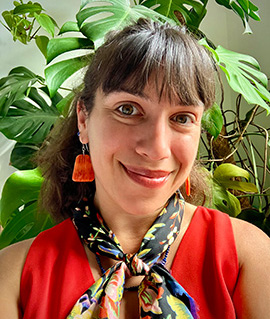
Alexandra Peck
Assistant Professor | Audain Chair in Historical Indigenous Art
Research Area

Althea Thauberger
Associate Professor (on leave)
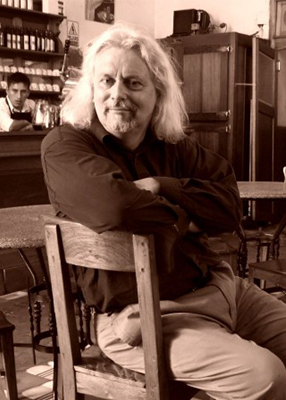
Anthony Shelton
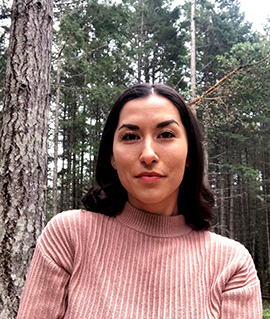
Camille Georgeson-Usher
Assistant Professor
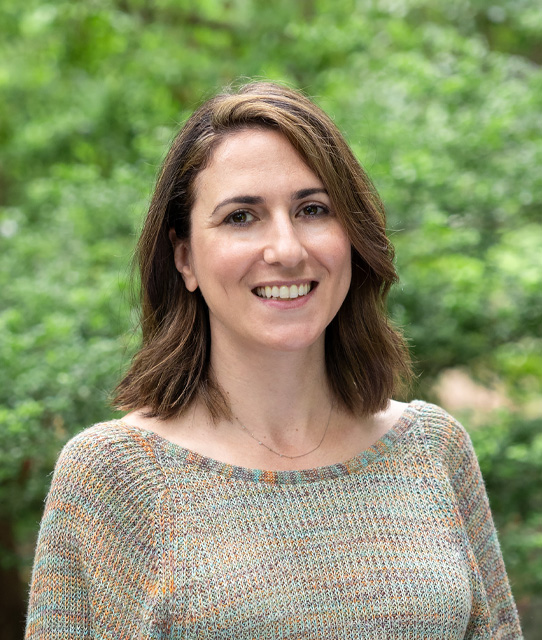
Christine D'Onofrio
Associate Professor of Teaching | Chair, Bachelor of Media Studies

Dan Starling
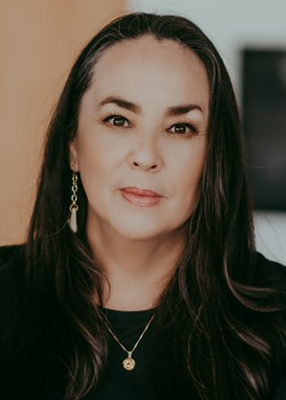
Dana Claxton
Professor (on leave)

Erin Silver
Associate Professor | Critical and Curatorial Studies Graduate Advisor
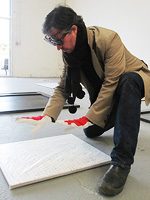
Gareth James
Associate Professor | Visual Arts Graduate Advisor
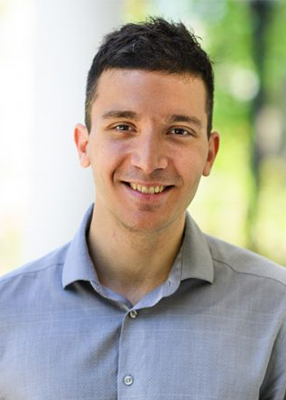
Georgios Makris
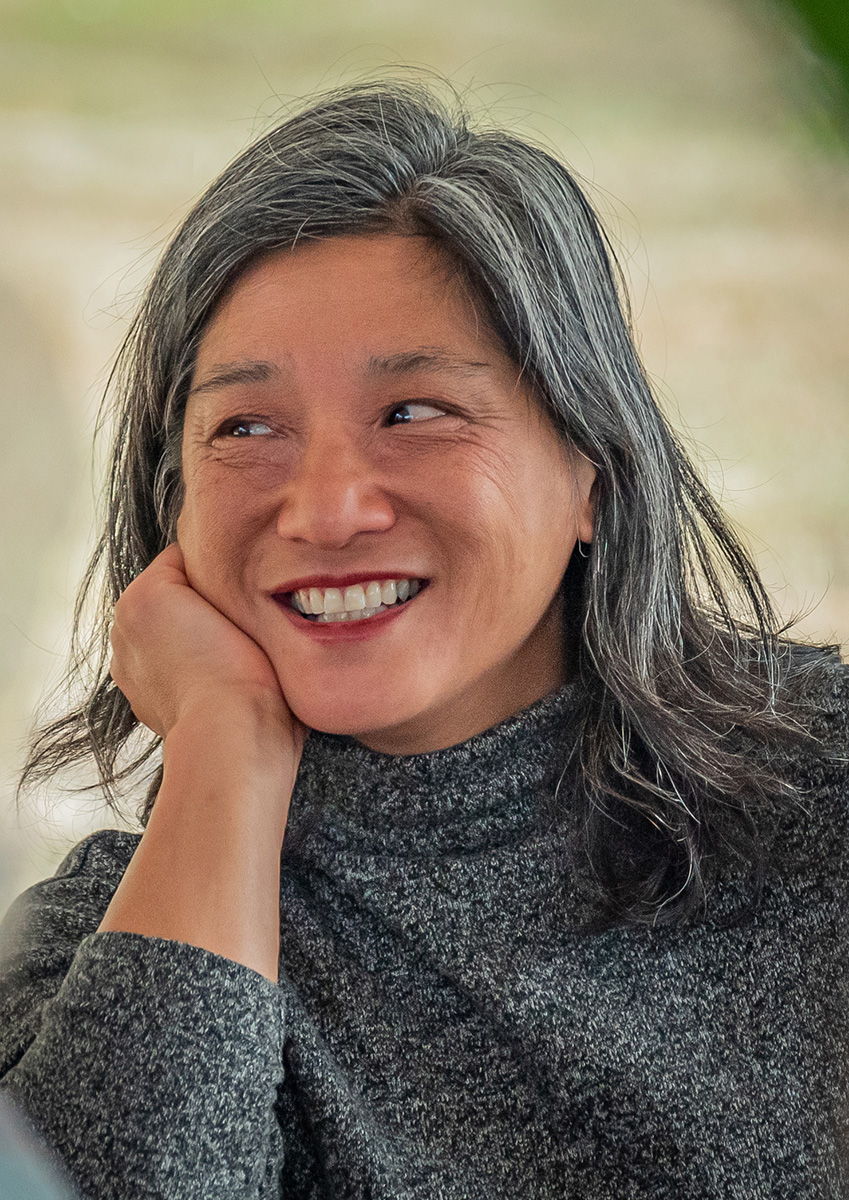
Germaine Koh
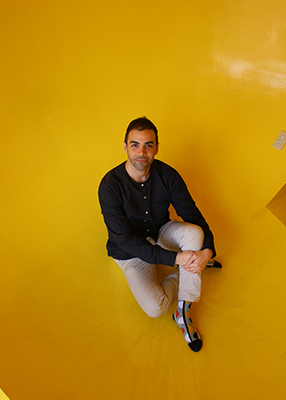
Ignacio Adriasola
Associate Professor
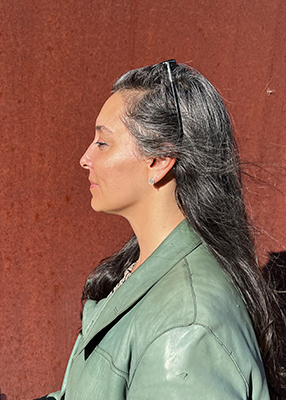
Jaleh Mansoor
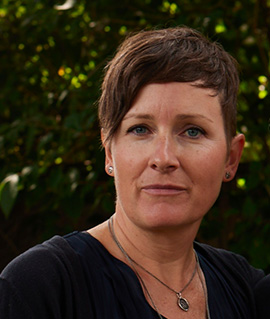
Jillian Lerner
Assistant Professor of Teaching

Joseph Monteyne
Department Head | Professor
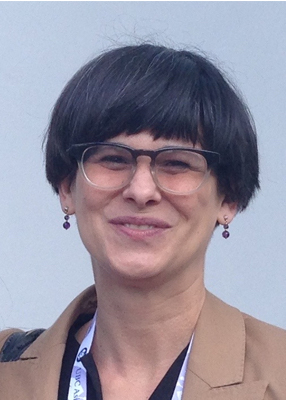
Julia Orell
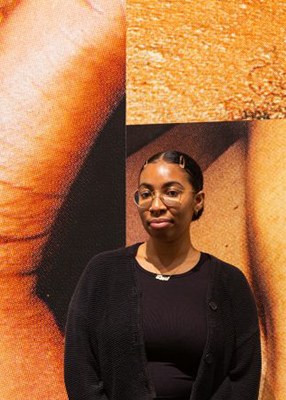
Karice Mitchell
Assistant Professor | AHVA Gallery Chair
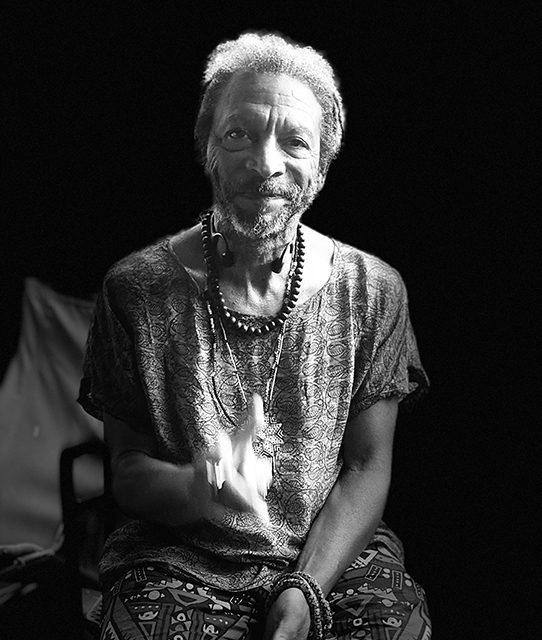
Manuel Piña Baldoquin
Manuel Pina Baldoquin

Nicole Georgopulos

Phillip McCrum
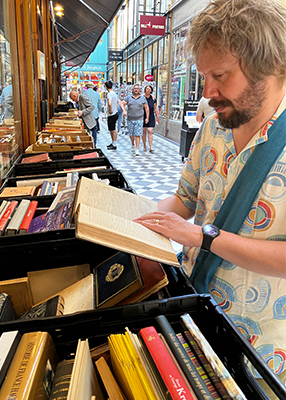
Saygin Salgirli
Associate Professor | Art History Graduate Advisor
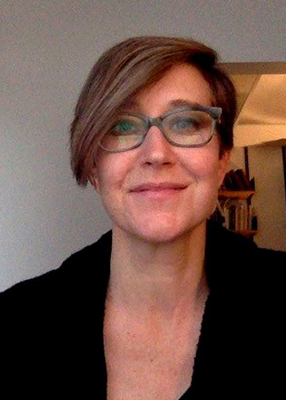
Sessional Lecturer

Antonio Tonel Fernandez
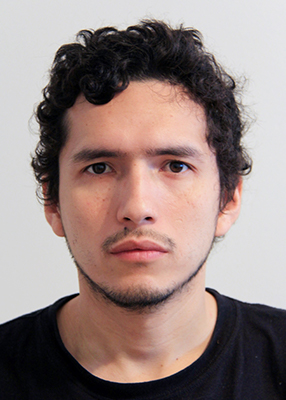
Carlos Colín
Carlos Colin

Carolyn Stockbridge

Damla Tamer
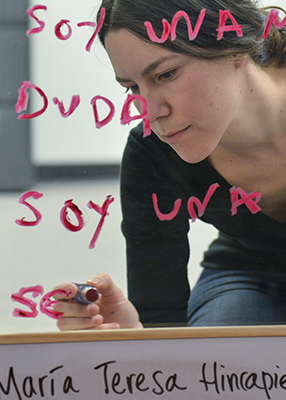
Guadalupe Martinez
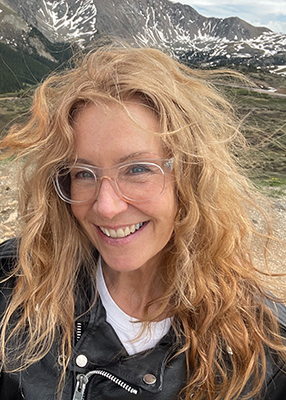
Kelly Lycan
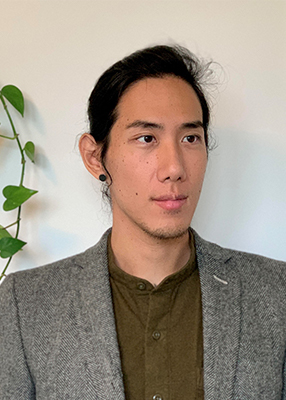
Rosamunde Bordo
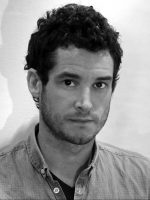
Scott Billings
- BIOCAPS Spotlight
- Workday Tutorials
- Faculty Onboarding
- Postdoctoral Fellows Onboarding
- Research Associates Onboarding
- Faculty by Research Areas
- Prospective Students
- Current Students
- Program Information
- Funding for Domestic Students
- Funding for International Students
- Biochemistry Graduate Program Statistics
- Post Doctoral Fellow Award
- BMB Postdoctoral Scholar Program
- Seminars & Events
Van Petegem, Filip

Filip Van Petegem
Biochemistry and Molecular Biology Faculty of Medicine CIHR new investigator MSFHR career investigator
Ghent University, 1998, Licensee in Biochemistry Ghent University, 2002, PhD in Biochemistry
Office: Life Sciences Centre, 2356 Office Phone: (604) 827–4267 Office Phone 2: (604) 827–4308 E-mail: [email protected] Website: https://www.vanpetegemlab.com/
- Publications
From cardiac arrhythmia to epilepsy – Ion channels in health and disease
Keywords: Cryo-EM, X-ray crystallography, electrophysiology
Our lab studies the structure and function of ion channels, membrane proteins that mediate electrical signaling in excitable cells. They are essential for neuronal signaling, the beating of our hearts, the contraction of muscle, and much more. Ion channel genes are targeted by thousands of genetic variants that result in ‘channelopathies’, a set of severe disorders ranging from inherited cardiac arrhythmias to chronic pain and congenital epilepsy. As humans age, the regulation of ion channels frequently goes haywire, leading to a range of acquired disorders.
How do ion channels gate? How do ion channels ‘remember’ past events? How do auxiliary proteins, small molecules, and post-translational modifications change their behavior? How do they assemble into larger complexes? How do disease-associated mutations change their function? We try to answer these questions via various methods.
As ion channels are complex and dynamic proteins, we utilize a combination of methods to study their behavior. This includes X-ray crystallography and cryo-electron microscopy to study their 3D structures, and electrophysiology to measure the electrical currents generated when the channels open. Current projects are focused on the communication between L-type calcium channels and Ryanodine Receptors, and on calcium-dependent ‘memory’ mechanisms in sodium and calcium channels. For more information see: https://www.vanpetegemlab.com/

Comprehensive List
- Google Scholar
Selected Publications
- Woll K, Haji-Ghassemi O, Van Petegem F (2021) Pathological conformations of disease mutant Ryanodine Receptors revealed by cryo-EM. Nature Comm. 12:807
- Ma R, Haji-Ghassemi O, Ma D, Jiang H, Lin L, Yao L, Samurkas A, Li Y, Wang Y, Cao P, Wu S, Zhang Y, Murayama T, Moussian B, Van Petegem F * , Yuchi Z*. (2020) Structural basis for diamide modulation of ryanodine receptor. Nature Chem Biol . 16:12461254 * co-corresponding authors.
- Gardill B, Tung C-C, Van Petegem F (2019) Crystal structures of Ca2+-calmodulin bound to NaV Cterminal regions suggest role for EF-hand domain in binding and inactivation. Proc. Natl. Acad. Sci. USA . 116,10763-10772.
- Haji-Ghassemi O, Yuchi Z, Van Petegem F (2019) The Cardiac Ryanodine Receptor Phosphorylation Hot Spot Embraces PKA in a Phosphorylation-Dependent Manner. Molecular Cell. 75, 1-14.
- Wang K, Holt C, Lu J, Brohus M, Larsen KT, Overgaard MT, Wimmer R, Van Petegem F (2018) Arrhythmia mutations in Calmodulin cause conformational changes that affect interactions with the cardiac voltage-gated calcium channel. Proc. Natl. Acad . Sci. USA. 115:E10556-E10565.
- Wong King Yuen SM, Campiglio M, Tung CC, Flucher BE, Van Petegem F (2017) Structural insights into binding of STAC proteins to voltage-gated calcium channels. Proc. Natl. Acad. Sci. USA .114:E9520- E9528.
- Das S, Gilchrist J, Bosmans F*, Van Petegem F * (2016) Binary architecture of the NaV1.2-beta2 signaling complex. Elife 5:e10960. * co-corresponding authors .
- Yuchi Z, Wong King Yuen S, Lau K, Underhill AQ, Cornea R, Fessenden J, Van Petegem F (2015) Crystal structures of Ryanodine Receptor SPRY1 and tandem-repeat domains reveal a critical FKBP12 binding determinant. Nature Comm . 6,7947.
- Lau K, Van Petegem F (2014) Crystal structures of wild-type and disease mutant forms of the ryanodine receptor SPRY2 domain. Nature Comm . 5:5397
- Kimlicka L, Lau K, Tung CC, Van Petegem F (2013) Disease mutations in the Ryanodine Receptor Nterminal region couple to a mobile intersubunit interface. Nature Comm . 4:1506.
- Gilchrist J, Das S, Van Petegem F *, Bosmans F* (2013) Crystallographic insights into sodium channel modulation by the beta4 subunit. Proc. Natl. Acad. Sci. USA. 110:E5016-5024 * co-corresponding authors.
- Sarhan MF, Tung CC, Van Petegem F *, Ahern CA* (2012) Crystallographic basis for calcium regulation of sodium channels. Proc. Natl. Acad. Sci. USA 109:3558-3563. *co-corresponding authors.
- Tung C-C, Lobo PA, Kimlicka L, Van Petegem F (2010) The ryanodine receptor N-terminal disease hot spot forms a cytoplasmic vestibule. Nature 468, 585-588.
- Van Petegem F , Clark KA, Chatelain FC, Minor DL Jr. (2004) Structure of a complex between a voltage-gated calcium channel beta-subunit and an alpha-subunit domain. Nature 429,671-675.
- Program Officers
- About Vancouver
- STS Main Page
- Other Units
History and Philosophy of Science Major
- Interdisciplinary Minor in Science Studies
- M.A. Admission Information
- PhD Admission Information
- Awards & Financial Aid
- MA Degree Requirements
- PhD Degree Requirements
- Graduate Students
- Postdoctoral Fellowships
- 2024/25 Winter Session
- Course Archive
- Stephen Straker Memorial Lecture
- Event Archive
- Current Major STS Journals
Requirements
The only requirement for admission is consultation with the advisor. In addition to Faculty requirements, the program requires the following:
First and Second Years (12 credits)
Students must complete HIST/PHIL 260, and at least 9 credits of first and second year HIST or PHIL courses.
The following are recommended : HIST 104, 105, 106, 240, 241, 259; PHIL 125, 220, 230, 240.
Third and Fourth Years (30 credits)
Students must complete HIST 393/PHIL 360, and one (3 credits) of HIST 403, 466, 468, 490 or PHIL 418, 426, 431, 432, 440, 450, 452, 455, 469, or 491. They must take an additional 15 credits from the following list, with no fewer than 6 credits in PHIL and 6 credits in HIST: HIST 392, 394, 395, 396, 398, 440, 487, 491, 493, 494, 495; PHIL 321, 337, 362, 363, 364, 369, 419, 427, 461, 462, 464, 469.
The remaining 9 credits will normally be taken from upper-level HIST or PHIL courses (excluding PHIL 400, 401). Students may substitute any of the following: AMNE 306; BIOL 446; ENGL 309; GEOG 345; MATH 446 ; PHYS 340; PSYC 312.

- Academic Calendar
- Campus Services
- Faculties & Schools
- Student Service Centre
- UBC Directory
August 8, 2024
Graduate Teaching Assistant (Winter 2024/2025 Academic Term)
Submit Application
GRADUATE TEACHING ASSISTANT
(2024/25 Academic term)
Course Number and Title: Various Undergraduate and Graduate Courses
Instructor: Various
Number of Positions:
Qualifications Required: Graduate students in Nursing; Undergraduate degree in Nursing required; Strong critical appraisal skills; Excellent interpersonal communication skills; Very good computer skills; Excellent academic writing skills.
Assists with organization of learning activities in the basic undergraduate program courses under the direct supervision of a faculty member. These activities may include:
- Assisting faculty with setup and planning of learning resources and activities
- Guiding groups of students through clinical skills experiential learning sessions
- Communicating with students on an ongoing basis throughout the term
- Providing direction to students regarding course learning activities
- Communicating with course leaders on an ongoing basis
- Assisting with evaluating student academic and/or clinical skill performance
Hours of work: 4 – 12 hours per week between September 2024 to April 2025
Current salary: *GTA I = $40.16 per hour
**GTA II = $38.65 per hour
Application:
Members of the CUPE 2278 bargaining unit (Teaching Assistants Component), please submit application with resume by 11:59 pm, Monday, August 19, 2024 to be reviewed for eligibility as preferred candidates. Applications submitted after August 19, 2024 may not be considered.
To apply, please fill out the Qualtrics survey, https://ubc.ca1.qualtrics.com/jfe/form/SV_1G1jF2XbGaEaZz8 . If there are any questions or concerns, please email [email protected]
_______________________________
*Graduate Student Teaching Assistant I is a graduate who has completed two (2) years’ service as a graduate student teaching assistant.
**Graduate Student Teaching Assistant II is a graduate student with less than two (2) years’ service as a graduate student teaching assistant.
Closing Date
Mon, August 19, 2024
Other careers
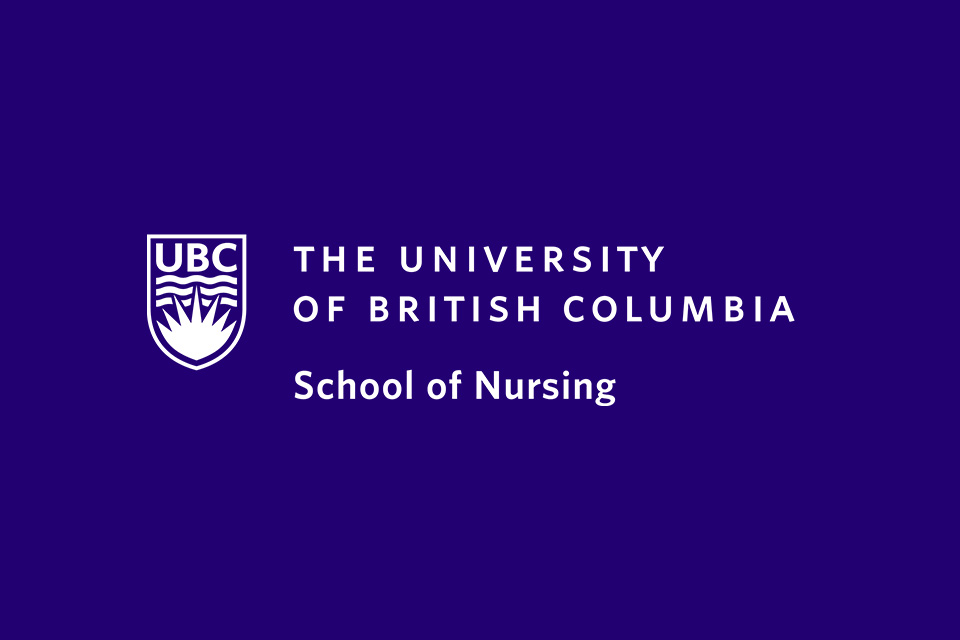
Sessional Nursing Practice Educator (formerly "Clinical Associate")
Closing Date: Ongoing
Graduate Teaching Assistant (Winter Session)
Closing Date: July 24, 2024
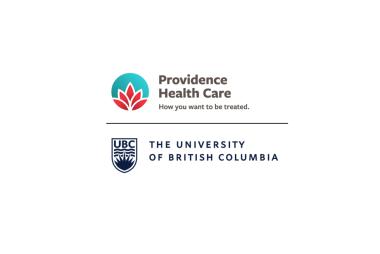
Providence Health Care/UBC Professorship in Indigenous Cultural Safety and Nursing, Assistant Professor (Tenure Track)
Closing Date: September 10, 2024
Sessional Lecturer (NURS 280)
Closing Date: August 16, 2024
Sessional Lecturer (NURS 504)
College of Liberal Arts & Sciences
Department of History
- Why Study History
- Student Financial Aid
- Visit Illinois
- Graduate Admissions
- Graduate Studies and Admissions
- Undergraduate Studies
- Convocation
- Proficiency Exams
- Course Listings
- Fields of Study
- Undergraduate Research
- Faculty Publications
- Women and Gender History Symposium
- Administration & Staff
- Affiliated Faculty
- Graduate Students
- Faculty Resources
- Undergraduate Student Resources
- Public Resources
- News Stories
- Newsletters
- Career Paths in History
- Alumni Spotlights
- Give to History
- Stay Connected
Graduate student spotlight: How former professional blues drummer Andrew Thomas became a historian
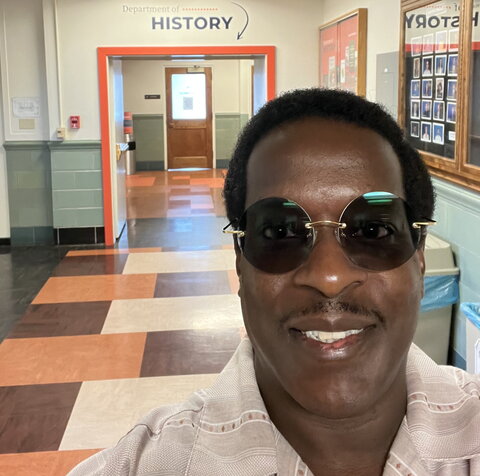
When Andrew Thomas, a former professional blues drummer, decided to study history, it was during the pivotal summer of 2020. The Covid-19 pandemic had shut down music venues across the world and put his 20-year career as a blues musician on pause.
Thomas had traveled the world and played with some of the biggest names in blues and roots music. He was a 2019 Blues Music Award Winner and wrote the book You Got the Gig, Here’s How to Keep it: A Working Musician’s Model for Success . Instead of going on tour that summer, he spent his time creating drumming tutorials and producing music.
That summer, the U.S. was also in the midst of a reckoning with police brutality against African Americans after the death of George Floyd. Thomas was deeply affected by the violence against Floyd and so many other Black individuals. After he saw a racist post from white fans about the killings, and the lack of empathy from the white drumming community after the death of Corey Jones, a drummer who was killed by the police, he became disillusioned with his white fanbase.
“That's when the axiom they love our rhythm but not our blues became really true for me,” he said. “They want to look at my YouTube channel and they want to look at my Facebook channel and all of this to forget about, you know, what they consider politics,” he said. “But it's not politics for me. It's my life. My life is on the line.”
While he was grappling with these events, he ran across a recording of a panel featuring prominent Black intellectuals and activists including Angela Davis, Huey P Newton, and Fred Hampton. He was struck by how their 1973 conversation about police brutality, injustice, and poverty could have easily taken place in 2020.
“And the thing that really caught my eye is they all could talk about these problems without swearing, without losing it, without crying. No emotion. They can have adult conversation about some of the most horrific things that we see every day. And I say, I want that. I want to be able to understand race. I want to be able to understand problems. I want to be able to disseminate information without using swear words, without breaking out into a cold sweat, without throwing a shoe at my television. You know, I want to be able to calmly speak and use my brain to understand what I'm seeing. So that was the catalyst, you know, to just go back to school. And I'm happy, it’s the best choice I've ever made.”
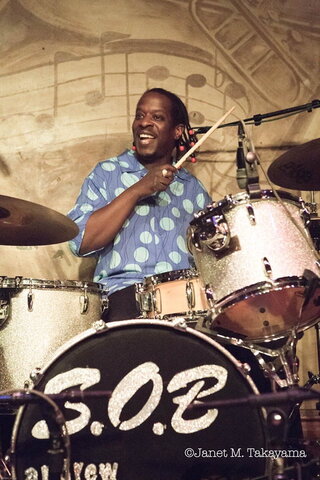
Thomas has always loved Black history and minored in African American studies for his bachelor’s degree at Western Illinois University. Learning about great African empires in Mali and Songhai, and leaders like Queen Nzinga in Angola and Queen Candace in Ethiopia, were exhilarating experiences for him, especially after hearing so much about European rulers and history during his K-12 education.
“I've always just loved you know Black history because of the feeling that Black history provides for most Black people . . . There are all these great, great civilizations, and once we find out about these things, the first thing that happens is we get a great rush and great emotion and we feel we’ve unlocked this consciousness,” he said. “And then once we’ve unlocked these things, we want some resistance, and we want to learn more about resistance and how can we fight the man and how can we get back some justice? And how can we be active? But once you unlock all these emotions, you're going to have to get yourself some education. You're going to have to do some reading and studying, and you're going to have to understand how humans relate to one another because Black folks aren't the only people that are suffering or have been through the history of suffering. But we just know we're suffering right now. So during the summer of 2020, it was just coming to fruition coming to, you know, to the head. And I decided to go back to school and study history.”
After completing his master’s degree in history at Illinois State University, he entered his PhD program in history at the University of Illinois, and just finished his first year in the program. His advisor is professor Sundiata Cha-Jua , who has become an important mentor for Thomas and encourages him to pursue the connections in Black music across the African diaspora.
Thomas’s first research paper focused on identifying Africanisms in blues after he realized that most books on blues start the narrative with slavery. Africanisms are characteristics of African cultures that can be traced through the cultures of the African diaspora. One example of an Africanism in blues music is the phrase mojo, which can be traced back to pouches worn around the neck by the Bakongo people from the Democratic Republic of Congo.
“Within this mojo pouch, you know, there might be some black dust from this riverbank, and a little cat bone, and all these little mystical little things and tea leaves, and herbs and spices,” he explains. “And this little pouch is bound up in this tight leather. And you never take it off from around your neck. As long as you believe in this little pouch, you have good luck. Well, this stuff is in blues and a lot of blues lyrics, a lot of blues music, even casting good and bad spells from the mojo is in these blues lyrics.”
Writing the paper was a foundational scholarly experience for Thomas and taught him the importance of tracing African American culture back to Africa.
“Identifying these Africanisms within the music was a really eye-opening study for me because it proves again that African, Black folks, we had a long history before chattel slavery and in order to study anything concerning Black people it starts with Africa . . . If you ignore Africa and you start with the United States, you’re going to miss something that’s intrinsic to why we do things that we do today,” he said.
Thomas is also the chairperson of the Bloomington-Normal Black History project, a group that was started in 1981 by Illinois State University professor Mildred Pratt, to collect oral histories from Black community members. Thomas is working on adding more oral histories to the collection stored at the McLean County Museum of History. He also organizes educational panels for the museum for occasions like Juneteenth and Black History Month. He recently had an article accepted for publication by the Journal of the Illinois State Historical Society about Black musicians in safe spaces in Bloomington-Normal from 1940-2000 that featured some of the oral histories he collected.
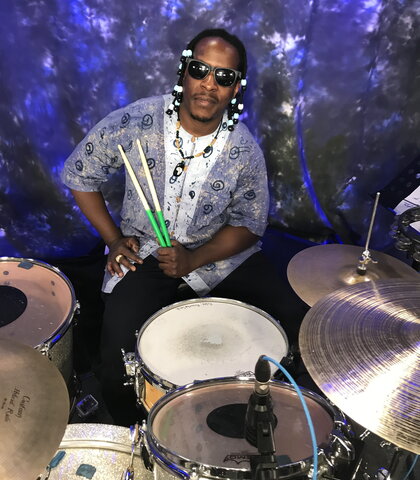
This fall, he’s excited to begin teaching as a TA for professor Marc Hertzman for HIST 104: Black Music. He hopes to incorporate the showmanship he learned as a musician to create compelling lectures for students.
Though he doesn’t play music professionally anymore, his home office is half library, half music studio. When he needs a break from his studies, he heads over to his drums. He remains passionate about the history of blues and thinks his dissertation topic will likely focus on Chicago blues.
Right now though, he’s just enjoying being a student and wants to soak in the educational experience as much as possible. His favorite part of life as a graduate student are the seminar classes, which he describes as feeling like a “really cool book club.”
“I just wanna enjoy being here” he said. “Being in school, being present in the moment, because I know what the work world feels like. I’ve done it for 20 years. I know what it’s like to sing for your supper. So I’m enjoying this, you know, this comfort of being at school and learning.”
- Election 2024
- Entertainment
- Newsletters
- Photography
- AP Buyline Personal Finance
- AP Buyline Shopping
- Press Releases
- Israel-Hamas War
- Russia-Ukraine War
- Global elections
- Asia Pacific
- Latin America
- Middle East
- Delegate Tracker
- AP & Elections
- 2024 Paris Olympic Games
- Auto Racing
- Movie reviews
- Book reviews
- Financial Markets
- Business Highlights
- Financial wellness
- Artificial Intelligence
- Social Media
Here’s a look at questions about Tim Walz’s military record
Walz’s military record under scrutiny as Vance, GOP question his service
FILE - Minnesota Gov. Tim Walz, the running mate of Democratic presidential nominee Vice President Kamala Harris, is pictured at a campaign rally in Philadelphia, Aug. 6, 2024. (AP Photo/Matt Rourke)
- Copy Link copied

CINCINNATI (AP) — Republicans are questioning Minnesota Gov. Tim Walz’s military record after Vice President Kamala Harris named him as her running mate this week.
Here’s a look at the issue:
He retired before his unit’s deployment to Iraq
Walz served a total of 24 years in various units and jobs in the Army National Guard. But it’s his retirement in 2005 that’s prompting criticism from some Republicans who are suggesting he abandoned his team to pursue a campaign for Congress.
As he ramped up for a congressional bid in 2005, Walz’s campaign in March issued a statement saying he still planned to run despite a possible mobilization of Minnesota National Guard soldiers to Iraq. According to the Guard, Walz retired from service in May of that year.
In August 2005, the Department of the Army issued a mobilization order for Walz’s unit. The unit mobilized in October of that year before it deployed to Iraq in March 2006 .
There is no evidence that Walz timed his departure with the intent of avoiding deployment. But the fact remains that he left ahead of his unit’s departure. In a statement, the Harris campaign pushed back on GOP characterizations of Walz’s service, and also noted that he advocated for veterans once he was elected to the U.S. House.
“After 24 years of military service, Governor Walz retired in 2005 and ran for Congress, where he chaired Veterans Affairs and was a tireless advocate for our men and women in uniform — and as Vice President of the United States he will continue to be a relentless champion for our veterans and military families,” the campaign said.
Before leaving Detroit, where she and Walz played up their support for organized labor , Harris on Thursday responded to a question about the criticism of her running mate’s record.
“Listen, I praise anyone who has presented themselves to serve our country,” she said. “And I think that we all should.”
Walz didn’t serve in a combat zone
Earlier this week Harris’ campaign circulated on X a 2018 clip of Walz speaking out against gun violence, and saying, “We can make sure that those weapons of war, that I carried in war, is the only place where those weapons are at.” That comment suggests that Walz portrayed himself as someone who spent time in a combat zone.
According to the Nebraska Army National Guard, Walz enlisted in April 1981 — just two days after his 17th birthday — and entered service as an infantryman, completing a 12-week Army infantry basic training course before graduating from high school.
While attending the University of Houston in 1985, he was reclassified as a field artillery cannoneer as a member of the Texas Army National Guard, later serving as an instructor with the Arkansas Army National Guard.
In 1987, Walz returned to Nebraska’s Guard detachment, continuing field artillery assignments while he completed a college degree. By 1996, he transferred to the Minnesota Army National Guard. In 2003, he deployed to Italy in a support position of active military forces in Iraq and Afghanistan. But he was not in a combat zone himself.
“Do not pretend to be something that you’re not,” Republican vice presidential nominee JD Vance said Wednesday as he campaigned in Michigan. “I’d be ashamed if I was saying that I lied about my military service like you did.”
Vance enlisted in the Marine Corps after graduating high school, serving four years as a combat correspondent, a type of military journalist, and deploying to Iraq in that capacity in 2005.
What to know about the 2024 Election
- Today’s news: Follow live updates from the campaign trail from the AP.
- Ground Game: Sign up for AP’s weekly politics newsletter to get it in your inbox every Monday.
- AP’s Role: The Associated Press is the most trusted source of information on election night, with a history of accuracy dating to 1848. Learn more.
Neither Trump nor Harris has served in the U.S. military. Trump received a series of deferments during Vietnam, including one attained with a physician’s letter stating that he suffered from bone spurs in his feet.
The Harris campaign statement said Walz “would never insult or undermine any American’s service to this country” and “thanks Senator Vance for putting his life on the line for our country. It’s the American way.”
What about his rank?
Harris’ campaign has referred to Walz as a “retired Command Sergeant Major,” one of the top ranks for an enlisted soldier. He did in fact achieve that rank, but personnel files show he was reduced in rank months after retiring. That left him as a master sergeant for benefits purposes.
Minnesota National Guard officials have said that Walz retired before completing coursework at the U.S. Army Sergeants Major Academy, along with other requirements associated with his promotion.
Associated Press writers Darlene Superville, Trenton Daniel and Richard Lardner contributed to this report.
Meg Kinnard can be reached at http://x.com/MegKinnardAP

Florida State University
FSU | Department of History
Department of History
Navigating dissertation and career: reflections on a journey in history by dave lunger, ph.d. 2024.

I would categorize my approach to earning my Ph.D. as nonstandard at best, and it stems from my lifelong interest in Military History. During my military career, I read anything I could get my hands on that helped me draw parallels of military science across the spectrum of conflict. This started as an undergraduate when I read The Life of Reason, or The Phases of Human Progress, written by Spanish-American philosopher, essayist, poet, and novelist George Santayana. In Volume I: Introduction and Reason in Common Sense, Santayana stated, “Those who cannot remember the past are condemned to repeat it.” Winston Churchill repeated this phrase in a 1948 speech to the British House of Commons when he said, “Those that fail to learn from history are doomed to repeat it.” Those words inspired me to learn as much as I could from others' past mistakes. I digested, absorbed, and analyzed major military conflicts across history and was keen to discover what separated history's greatest military leaders from everyone else.
After being commissioned in the United States Air Force, my reading covered a broad spectrum of military operations ranging from the bronze age to the modern age. I was fascinated with the history of Alexander’s Balkan, Persian, and Indian Campaigns; the Punic, Gallic, and Ceasar’s Civil Wars; the Norman Conquest; the Crusades; the Thirty Years War; English Civil Wars; the War of the Spanish Succession; the Seven Years’ War; The American Revolutionary War; the Napoleonic Wars; the American Civil War; the Franco-Prussian War; and World War I and II. My interests drove me to complete my M.A. in Military Science with a thesis on the Second Punic War in 2004. I used my understanding of Military History in various positions in the USAF to develop tactics and strategy while teaching in the United States Air Force Weapons School, and this sparked a desire to continue my education.
On Friday, 30 September 2016, I retired from the United States Air Force after twenty-seven years of service. I felt it was time to do something else with my life as I was now half a century old. What I had always wanted to do but never had had the opportunity to do was to get my Ph.D. in military history. I was not driven by any grand design to enter academia; I was doing it for personal growth. I have always believed that modern strategic thought can trace its roots back to the Napoleonic Wars; every strategic planning course I took in the Air Force encouraged reading Clausewitz and Jomini, and I wanted to understand this genesis better, so I planned to pursue a Ph.D. in Napoleonic History. In a search for universities specializing in the period, Florida State University quickly vaulted to the top of the list of prospective schools. So, I applied, and after being accepted, I began pursuing a doctoral degree.
While pursuing my degree, I was offered a position at FSU as the Director of Project Management at the world-acclaimed National High Magnetic Field Laboratory. I direct the project management functions of the MagLab and facilitate the definition of project missions, goals, tasks, and resource requirements so that the lab can offer a suit of high powered magnets more than a million times more powerful than the Earth’s magnetic field to answer fundamental questions across scientific disciplines that impact our world. The high magnetic fields generated by our magnets are used to probe matter and uncover unique properties. The scientific research at the MagLab is leading to big discoveries in tomorrow’s quantum technologies, combatting climate change, protecting human health, enabling the magnet-based machines of the future, paving the way to new energy solutions, and solving the mysteries of the universe. It was an opportunity I could not turn down, and it meant that my academic pursuits took on a secondary priority.
One advantage I had was that I had completed my comprehensive exams before starting work for the MagLab. This meant I had already advanced to the dissertation phase as a doctoral candidate, so I only had to work on my dissertation which at this time was a study of Napoleonic heavy cavalry that compared Napoleon’s Imperial Guard Cavalry to England’s Household Brigade. Working full-time in a challenging setting made it difficult to focus on writing my dissertation, but I was determined to keep making progress. I used my time wisely and spent several years reading and researching until I had a coherent story to adapt to a research project. Once I started writing, I committed to writing one page a day until the dissertation was finished. This served me well until it became apparent that the scope of my dissertation would push the page total well over nine hundred pages. This forced me to scale back my original thesis. Downscaling my work was not all that difficult since I had taken the time to digest way more material than I could ever use. A completely different thesis emerged from this effort titled “Four Stuart Kings: Arbitrary Rule and The Origins of The Life Guards.” This new study traces the roots of the British Life Guards through the first four Stuart kings and illustrates that the Stuart interpretation of kingship, which emphasized the Divine Right of Kings, could only be implemented with the aid of a loyal contingent of Guards.
By committing myself to making progress over time made graduating a reality. Now that I have my degree, the question has been asked, “What do you plan to do with it?” I would be lying if I said I had no idea, but since I have already transitioned into a career field that I enjoy, it seems like there is little to do other than continue researching and writing about topics I like, but to what end? I was blessed in my Air Force career to be allowed to teach at the United States Air Force Weapons School, where I taught graduate-level instructor courses that provided our pilots with the world's most advanced training in weapons and tactics employment. This is where the teaching bug bit me, and I have always looked for teaching opportunities. At this stage of my career, I would be happy to continue in my current position and do some adjunct work to keep my mind in the game.
Completing my degree taught me a few lessons I would like to impart to anyone seeking an advanced degree while working. First and foremost, you need to stay committed. This was the most important thing for me as there were plenty of days that I had a full plate of activity, and writing one page of a dissertation just seemed like another task I could not get to in the limited time I had that day. Secondly, you must have a plan of action. While it is true that no plan survives first contact with the enemy, it should not keep you from making one. Having a plan allows you to make critical decisions when things don’t go your way, like I had to do when I descoped my research topic. Had I not invested the time and effort into reading and researching I would not have been able to pivot to a different thesis.
401 Bellamy Building 113 Collegiate Loop Tallahassee, FL 32306-2200 (850) 644-5888 | Fax: (850) 644-6402
Faculty and Staff Resources
Connect with the department.

IMAGES
VIDEO
COMMENTS
The History PhD Program at UBC is led by prize-winning faculty and offers a diverse program of studies in local, regional and global histories. The PhD program in the Department of History is designed to take five years to complete. It requires full-time academic residency until the attainment of candidacy. PhD Program Overview Students in the ...
In 2013-14, the Arts Co-op Program and the UBC Department of English launched UBC's first Ph.D. Co-op Program. This exciting initiative allows Ph.D. students to widen their range of professional skills through paid work experience in fields such as academic administration, communications, project management, and archival, government, and non-governmental organization (NGO) research.
View all events. UBC's Department of History offers two graduate degree programs: a Master of Arts (MA) and a Doctor of Philosophy (PhD). Working closely with faculty supervisors, our graduate students engage with cutting-edge scholarship and produce their own path-breaking research.
To ensure UBC receives your results correctly, you must use the following details on the application: Name of institution: The University of British Columbia. Name of person/ department: Graduate School Admissions. Address: 170--6371 Crescent Road, Vancouver BC V6T Z2, Canada.
The Department of History at the University of British Columbia is a vibrant centre for scholarship - ranking among the top history departments in the world. Our professors are dedicated teachers and award-winning researchers. ... History PhD Candidate Dane Allard wins 2024 Native American and Indigenous Studies Association's Most Thought ...
email [email protected]. phone778 895 5088. location_onBuTo 1104, 1873 East Mall, Vancouver, BC, V6T1Z1, Canada. As a history professor, Dr. Yu's research and teaching has been built around collaborations with local community organizations, civic institutions such as museums, and multiple levels of government.
The History Department at the University of British Columbia is an intellectually vibrant centre of scholarship and teaching. We are one of five original departments in the Faculty of Arts that commenced offering undergraduate classes when the University of British Columbia accepted its first students in the fall of 1915. Our faculty have won national and international research fellowships and ...
The Department of History offers Ph.D. and M.A. programs, each requiring a dissertation/thesis, in the fields of Asian, Canadian, First Nations, British and European (early modern and modern), U.S., Latin American, and Environmental History and in the History of Science. In addition to defining fields regionally, the Department emphasizes ...
UBC History Graduate Program Room 1297 - 1873 East Mall Vancouver, BC Canada V6T 1Z1. For Electronic Transcripts: The issuing institution must send a link to a secure site to the History Graduate Program at [email protected]. The graduate program will download the transcript from the secure site. Important: an e-transcript is downloaded via a ...
Classicists study the languages, literature, material culture, and history of Ancient Greece and Rome. The Department of Ancient Mediterranean and Near Eastern Studies offers a PhD Classics with the option of three streams: Classics (language-based program), Ancient History, or Classical Archaeology. Classics students develop competence to the highest level in Greek and Latin; Ancient History ...
The Art History PhD program opens with a required, rigorous, two-term methodology seminar led by two specialists in divergent areas. Additional seminar offerings are broad and diverse. Students are encouraged to take seminar coursework outside the department and pursue their specialization or extend the scope of their studies.
Overview. Historians study the past to better understand the present. They analyze the forces and influences that have affected human experiences and shaped different societies over time. For more than 80 years, our graduate program has promoted this analysis from social, cultural, political, and intellectual perspectives in diverse contexts ...
The PhD in Anthropology at UBC Vancouver is based upon a combination of residency, coursework, a comprehensive examination and dissertation, and is expected to be completed within six years. A new comprehensive examination guideline has been approved in Spring 2023. View more program information.
Several philosophy department faculty are members of the Science and Technology Studies program in cooperation with faculty from History, English, and other departments. The STS program offers an MA program and a PhD stream within the philosophy PhD. Philosophy PhD students enrolled in the PhD stream take three STS seminars as part of their graduate coursework.
The UBC History Department's Chinese history courses cover almost every aspect of China's past and present. The Department of History at the University of British Columbia offers a wealth of opportunities for both undergraduate and graduate students interested in studying the history of China. Our faculty's strengths range from the earlier ...
PhD Program. UBC School of Information's Doctor in Philosophy in Library, Archival and Information Studies is a four-year funded program that combines coursework with focused independent study and research. Our students have ready access to faculty members and benefit from unique opportunities at a comprehensive, world-class, research ...
For more than 80 years, our History graduate program at University of British Columbia has promoted this analysis from social, cultural, political, and intellectual perspectives in diverse contexts throughout the world. University of British Columbia. Vancouver , Canada. Top 0.5% worldwide. Studyportals University Meta Ranking.
Students in the PhD in Art History program are encouraged to situate art in its historical context, to analyze its impact on the world around us, and to develop theoretical frameworks that contribute to critical thinking and engage with debates in the field. The program involves coursework, two foreign languages, a comprehensive examination, dissertation proposal, roundtable presentation ...
Each entry under the Academic History section of the application must include pdf copies of official, up-to-date, transcripts for all current and previous post-secondary study (see exception for current and former UBC students below). ... University of British Columbia (UBC) - Graduate Admissions | Vancouver Campus ... University of British ...
As of March 2012, UBC Library has digitized and made openly accessible the full-text of more than 32,000 theses submitted by graduate students between 1919 and 2007. In addition to providing information about specific fields of study these theses also reveal important information about changes in pedagogy at the University and within academic ...
email [email protected]. phone604 822 4839. location_onAuditorium Annex Offices A 269. T'ai Smith received her MA and PhD from the Program in Visual and Cultural Studies at the University of Rochester and her BA in Visual Arts/Art History from Barnard College, Columbia University.
Filip Van Petegem Professor Biochemistry and Molecular BiologyFaculty of MedicineCIHR new investigatorMSFHR career investigator Education Ghent University, 1998, Licensee in BiochemistryGhent University, 2002, PhD in Biochemistry Contact Office: Life Sciences Centre, 2356Office Phone: (604) 827-4267Office Phone 2: (604) 827-4308E-mail ...
Science and Technology Studies. Vancouver Campus. 1866 Main Mall. Buchanan E370. , Tel 604 822 8837. Email. Requirements The only requirement for admission is consultation with the advisor. In addition to Faculty requirements, the program requires the following: First and Second Years (12 credits) Students must complete HIST/PHIL 260, and at ...
GRADUATE TEACHING ASSISTANT(2024/25 Academic term) Course Number and Title: Various Undergraduate and Graduate CoursesInstructor: VariousNumber of Positions: Qualifications Required: Graduate students in Nursing; Undergraduate degree in Nursing required; Strong critical appraisal skills; Excellent interpersonal communication skills; Very good computer skills; Excellent academic writing skills.
Thomas has always loved Black history and minored in African American studies for his bachelor's degree at Western Illinois University. Learning about great African empires in Mali and Songhai, and leaders like Queen Nzinga in Angola and Queen Candace in Ethiopia, were exhilarating experiences for him, especially after hearing so much about European rulers and history during his K-12 education.
According to the Nebraska Army National Guard, Walz enlisted in April 1981 — just two days after his 17th birthday — and entered service as an infantryman, completing a 12-week Army infantry basic training course before graduating from high school.
Department of History. 401 Bellamy Building 113 Collegiate Loop Tallahassee, FL 32306-2200 (850) 644-5888 | Fax: (850) 644-6402